#cook:たまねぎ
Photo

✿ めんつゆレモンソースの豆腐ハンバーグ
#cook:めんつゆレモンソースの豆腐ハンバーグ#cook:木綿豆腐#cook:豆腐#cook:レモン汁#cook:ハンバーグ#cook:ひき肉#cook:合い挽き肉#cook#cook:主菜#cook:2020〜#cook:めんつゆ#cook:味醂×めんつゆ#cook:味醂×めんつゆ×レモン汁#2020〜#cook:味噌#cook:パン粉#cook:たまねぎ#レシピ#レシピ:ハンバーグ
10 notes
·
View notes
Text
MPW Ep 2 Subtitle Corrections
Subtitle Corrections: Ep 1 here
Cultural/Language Tidbits: Ep 2 here
Same translation disclaimer applies. Thanks to everyone reading the first post and geeking out with me in the notes, I really appreciate it XD Ok, Ep 2, let's go! Sorry in advance for the length!
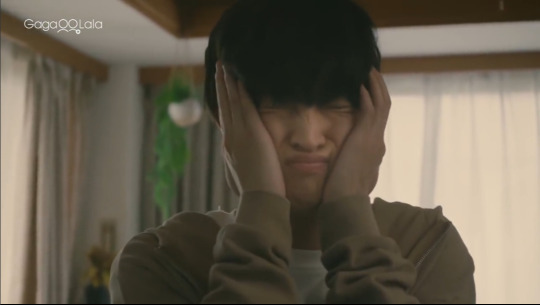
If you're wondering why Yoh's freaking out about the rainy season even though they've been together for 3 years, the manga artist posted a clarification on twitter:
By the way, “it’s been 3 years since then” – that phrase refers to it being 3 years since that conversation regarding the slave contract. As for living together, they’ve only just started (to do so) around Mar/April*, so (at this point) it’s only been a few months (for them).
What if (I) got it wrong…. I remember making a note of it, but the file that I wrote it in and passed over (to the crew) couldn’t be found right, so… (was it) a dream?”
*Japan's rainy season comes around June/July, so this means that this is the first rainy season these two have been experienced together.
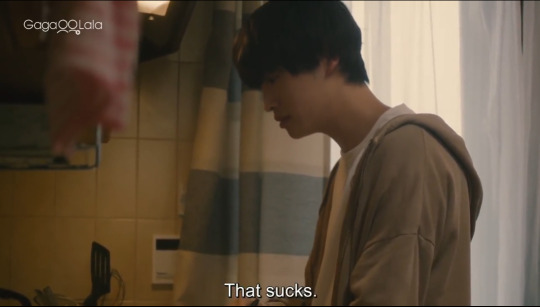
[Y: まずっ]
Y: Tastes bad
In case the original "that sucks" sounds like Yoh might be talking about the news of the young forecaster - he's really just talking about the food here.
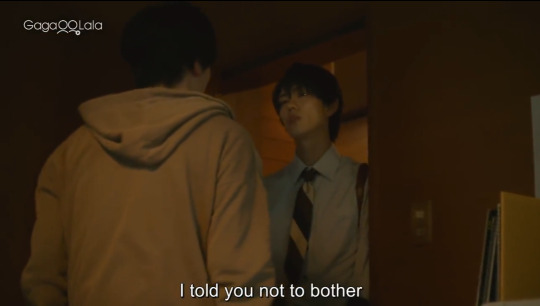
[S: 遅くなるからいらねぇっつっただろう]
Original: I told you not to bother since I returned late
Mine: I told you I wouldn't need it cause I'd be late right?
This is actually a pretty harsh sounding line tbh. It's sort of inkeeping with Segasaki's curtness, but still pretty harsh - so this tells us he's tired after a long day, and explains the frown on his face that Yoh just wipes away with his cuteness

Nikujaga literally means meat and potatoes. It's a stewed dish and a very well-loved comfort food. Super easy to make too (link goes to an easy to follow recipe, and the site also explains a little about the dish).
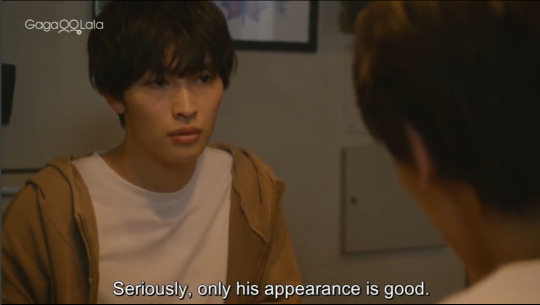
[Y: 本当、顔だけはいいよな]
Y: Really, it's only his face that looks good.

I've talked about this in my cultural/language tidbits for this episode (linked up top) but I'll add it here for completion's sake
[Y: あ、いや。なんでもない…です*]
(Ah, iya, nandemonai…desu*)
Y: Ah, no, it's….nothing*
Yoh let's his sentence trail off before tacking on a "desu" at the end. "Desu" is an ending verb characteristic of "polite" speech, which Yoh doesn't use frequently with Segasaki (in fact, by this point, he has not used polite speech with Segasaki at all, except for maybe saying the full form of the word "welcome home", and even that's pushing it). Here he adds it at the end as an afterthought (the polite form of "iya" would be "iie", if he had wanted the whole sentence to be polite from the get go), which tells us that Yoh's feeling a little off-kilter here, and does introduce the slightest distance between him and Segasaki. We'll see this distance increase as the episode goes on.

[Y: いや、どう考えても食べ過ぎだろう]
Y: No but, no matter which way you look at it, (he's) eaten way too much hasn't he?
Btw, if your hair started standing at the spoon scraping the pot - in the manga artist's post about visiting the shooting venue (as well as during Ep 1 twitter space) it was mentioned that Mashiko, the actor, can actually cook, so during filming they had to tell him what someone who can't would likely do, and also asked him to do the housework poorly (because Yoh's not supposed to be good at cooking or housework hahaha)
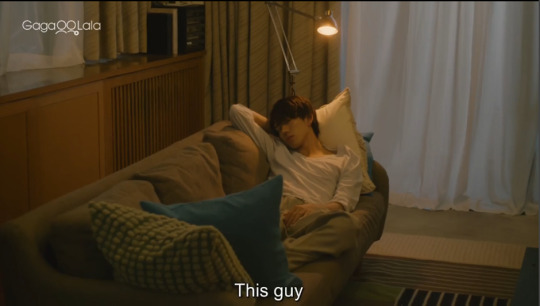
この人*、明日も朝早いんだよな。たぶん。
Original: This guy, has an early morning again tomorrow. Probably.
Mine: This person*, has (to leave) early tomorrow morning too. Probably.
*The word here is "kono hito", literally "this person". There's actually nothing wrong with the translation "this guy" tbh because that's a fairly neutral term in English, but I'm highlighting it here because in his monologues, Yoh usually refers to Segasaki using much rougher language, such as "koitsu, aitsu", except when he addresses Segasaki directly in his head. I'll talk more about how Yoh addresses Segasaki in the analysis post, but for now - this sentence hints that Yoh has clocked Segasaki's tiredness (subconsciously or not) and is feeling a little bad for him. Then again he quickly hides that by adding on "probably". (Adding the word "probably" behind your sentence is a common way to express doubt/negate what you just said, and incidentally is commonly used by comedians to deliver a punchline).
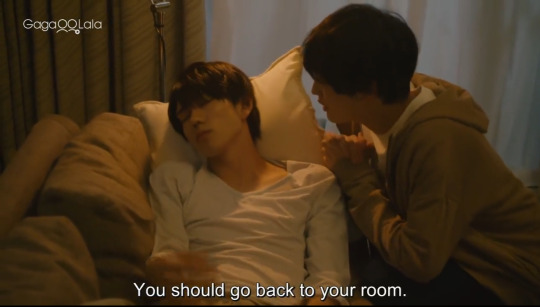
[Y: あの*…あの…寝るなら部屋でとおもって。]
Original: Um… Hey… You should go back to your room.
Mine:
Um*... Um... if you're going to sleep then, (it would be better to sleep) in your room - at least that's what I thought...
*"あの…" (ano…), translated as "um" here, is a common sound you use when you want to get someone's attention but don't want to sound too demanding - it actually isn't being polite per se, but it does show the hesitancy with which Yoh approaches him. Contrast this with the way Segasaki gets Yoh's attention (so far it's just been "Yoh" or "Oi" - the latter of which you would NOT use unless you were close to the person, or looking for a fight).
As a general rule of thumb, the level of politeness in Japanese is directly correlated with the length of the sentence and just how far you can beat around the bush. So, Yoh's suggestion that Segasaki goes to sleep in his room is literally just "if sleeping, then room..." and everything else in that translation is assumed. He may not being using polite speech forms here (that would be "to omoimashita" instead of "to omotte") but this is still a common way to be polite because he's making a suggestion that is so mild Segasaki can choose to ignore it. This is a great example of Brown & Levinson's "negative politeness" which we'll revisit when analysing their speech patterns, and which you can read about in entirely too much detail here (free to read).

[Y: じゅあ、俺は寝るので**
あの、その、そういうことで、おやすみ]
Original:
Then, I’ll go to sleep.
That…sort of thing. Good night.
Mine:
So then, I'm going to bed, therefore**...
Um... that... with that... night!
"Therefore" is an awkward translation for the word ので (node), which is more often translated as "so". I've chosen to use that word because "node", whilst again not a polite form per se, is less colloquial than the more commonly used "から(kara)", to mean the same thing. It tends to pop up more in writing than in speech. "Therefore" doesn't make a sentence polite/formal in English, but it's definitely less colloquial than using the word "so". The use of "node" is just that tiny bit out of place in this sentence paired with the informal pronoun "ore" for "I" as opposed to the more formal choice of "boku".

Again, Yoh answers Segasaki properly here with a "はい (hai)" as opposed to his usual "un" (which is a sound that expresses agreement), when told that Segasaki will be late again. There actually aren't very many moments where Yoh does speak politely to Segasaki (he's definitely rude when he talks about Segasaki in his head hahaha), so these moments stand out. This whole short exchange, together with the random -desu he added earlier, just make Yoh's sentences a little more stilted/awkward, and more distant. Individually they don't deserve much mention at all, but together, and in the context of his jealousy, show just how unsure Yoh is about where he stands with Segasaki.
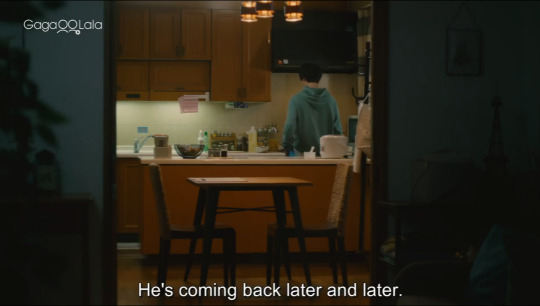
[Y: あの人の帰宅が遅くなり]
Y: That person returned home later and later
"That person" - similar to the above usage of "this person". This sentence is incomplete - the verb form of the last word - 遅くなり (osokunari) indicates that there should be a second part to the sentence (the "completed" form would be osokunatta). But after he says this, there is a pregnant pause, as Yoh puts his phone down and continues cooking alone. The pause continues all the way into the next scene, before the sentence continues, highlighting the loneliness that Yoh feels.

[Y: 当然、触れられることもないままに]
Original: Of course, he did not touch me at all
Mine: (and) of course, (I) remained untouched (by him) as well
The literal translation for this would be "(the situation in which I) was not touched (by him) continued on as well". Yoh uses the passive form of the word "touch", which places the emphasis on Yoh "receiving" the action of being touched as opposed to placing the emphasis on Segasaki "carrying out" the action of touching Yoh. Consider the difference between the sentences "I was hurt by him" and "he hurt me". The former is the passive form, and is super common in Jp, much less common in Eng. If this is confusing - welcome to Jp grammar just know that the emphasis of this line is more on what Yoh does not have, rather than what Segasaki has not done. It accentuates Yoh's feelings of emptiness and loss.
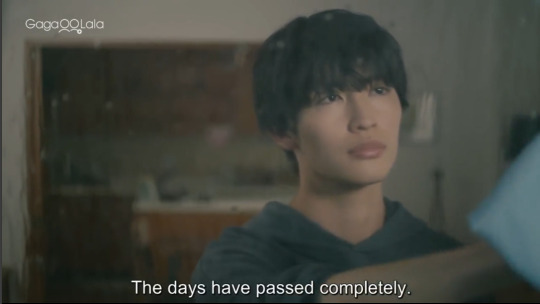
Y: すっかり日々は過ぎて
Y: The days pass by completely ...
Similarly, this sentence is "incomplete", and is instead continued by Segasaki walking in and telling Yoh he'll be late again. (This whole bit just hurts my soul tbh, Yoh is so lonely. )
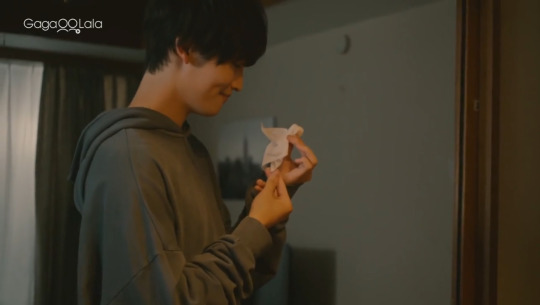
This is a teruteru bouzu aka a charm of sorts for good weather. See the cultural tidbits post for Ep 2 linked up top for more info!

This is said really strongly, and gives the "what the hell are you doing" feel. Yoh's truly upset here.

I try not to care about some of the subs in these side conversations because they don't add much to the main story and these posts are already too long, but this sentence should really be "Dammit, maybe I should (go) troll the chat" (and the previous sentence should be "If this was broadcasted in a certain country it would be instant death" aka N.Korea ^^;) and I just think it was a nice touch to hint at the fandom wars/flaming that goes on between fans hahaha
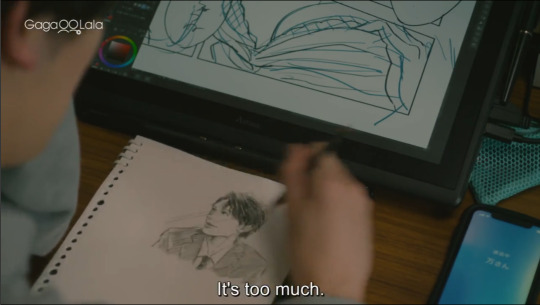
[Y: しんどい]
Y: This is too draining
The word here used is "shindoi", which is a term used when you're feeling mentally/physically exhausted/drained, and carries a sense of frustration (at feeling this way) and sometimes (emotional) pain.
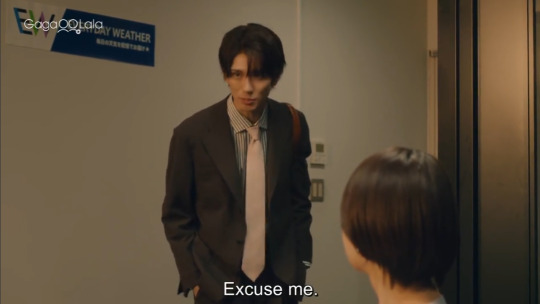
This. Is. Huge.
Segasaki does 2 things here - one, he rejects an after-work meal, which you rarely do because Japan is all about the group and rejecting a group invite, to welcome a new member, can make you seem like you aren't a team player - two, the guy who invites him is his senior, which you can tell because Segasaki sticks to polite speech forms whilst the other guy does not. It's still relatively casual, so you can tell he's got a good working relationship with them (probably why he's not worried about rejecting them) but still. In Segasaki's world, Yoh is the No. 1 priority.
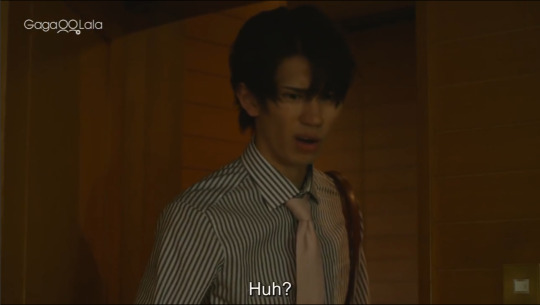
This is more accurately "WTF". There are many sounds in Japanese that aren't exactly words, but carry a lot of meaning - "Haa?!" is one of them, and is a very rude way to express a lot of anger and shock. Please, never say this in real life. You will royally piss off whoever it's directed at and if you are outside a Shibuya bar you will get punched.
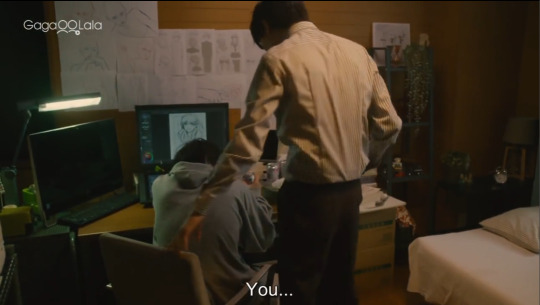
The word used here is てめぇ (temee), which is a really rude way to say "you", and has the same energy as "you bastard". Segasaki usually uses the informal pronoun "omae" for "you" when he talks to Yoh, he's definitely pissed off here.

This is the same word, "shindoi" again.
I'm going to put the rest of the whole argument here with just my translation because it's too long to screencap the whole thing.
[S: 何なんだよ?このエロい惨状は
Y: うるさい。
Y: 俺は売れっ子エロ漫画家になるんだ
S: なんだそりゃ。おい *takes away beer can*
Y: 売れっ子さんが シコリながらネーム描くと いいのができるって言ってた
S: なんも描けてなかったぞ。
S: おい、だめだっつってんの
S: 飲みすぎ 出すもん出して 寝てただけだろう
Y: 黙れ!
Y: 俺はエロくて 抜ける漫画描いて いっぱい稼いで
Y: 早く こんなとこ出ていくんだ
S: はあ? おい、お前 どういうつもりだよ
Y: どうもこうもないよ!
Y: 平気で抱かれてると思うなよ 。
Y: 俺のこと、好きでもないくせに
Y: 便利な奴隷としか思ってないんだろう?そんなにやりたきゃ隣のキャスターとやってろよ
S: お前 さっきから 何を...
Y: 俺はあんな風に笑いかけられたことない]
Breakdown:
S: What's up with this? This lewd disaster of a scene
Y: (You're) annoying!
["うるさい (urusai)" is often translated as "shut up", but it literally means someone is being "noisy", and here is more of a complaint that Segasaki is being bothersome]
Y: I'm going to become a hot-selling erotica manga artist!
[the word used here is 売れっ子 (urekko), which literally means "someone who gets huge sales" and mostly refers to idols, entertainers, TV personalities etc. So Yoh is not just saying he's going to become popular, he's saying he's gonna be like a celebrity manga artist, which is why Segasaki snorts a little at this]
S: What's with that? Hey. *takes away beer can*
Y: The hot sellers say that if you jerk off whilst drawing your storyboard, you'll come up with good stuff
[urekko-san is a pretty cute way of referring to these popular artists]
S: You've not drawn anything, you know? [this is said with a really indulgent air, which contrasts directly with the more authoritative tone of the next line]
S: Hey, I'm telling you no more *grabs beer can*
S: You drank too much. You just shot what you shot and then went to sleep didn't you?
[And this is back to an indulgent tone - also, everyone knows Segasaki is talking about cumming here, he just doesn't actually say it so directly]
Y: Shut up! ["黙れ (damare) - contrast with "urusai" earlier. The former is used much less commonly and really does mean to "be quiet". This is why Segasaki pauses and looks at Yoh. Up until now Segasaki just thinks Yoh's gotten drunk and is whining cutely, but this word means things are serious.]
Y: I'm going to draw manga that is erotic, that you can wank off to, and then earn lots of money [this is a call back to the conversation with Man-san over the phone in Ep 1, which I did not include earlier because I didn't think it was important to the story when Yoh says "the work that was released last month was amazing! There was a big buzz around the topic "I can't wank off (to this)" - Yoh was being sarcastic here, meaning that he got reviews that his work wasn't erotic enough]
Y: and leave this sort of place soon!
S: What? Hey - what (the hell) are you thinking? [Again, "haa?" here shows he does NOT like what Yoh's saying, but he does soften the end of the sentence with a "yo"]
Y: I'm not thinking of anything!
Y: Embracing me so easily - don't think you can (keep on) doing that [again, this is the passive form, so the emphasis is on Yoh being embraced, and here has the nuance of "don't think I'll just (keep on) being fine with being embraced (by you) like it's some sort of norm"]
Y: when you don't even like me [this line has quite a bit of bitterness in it - the emphasis here is strongly on Segasaki and his apparent "non-liking" of Yoh my english is dying.]
Y: You think of me as just a convenient slave, don't you?
Y: If you want to do it that much, go do it with that forecaster next to you!
S: You... from the start... what have (you been saying?)
Y: I have never been smiled at like that before [again, this is in passive voice]
It's obvious from the acting alone that this entire argument is pretty emotionally charged - this is also reflected in the language because Yoh uses the pronoun "ore (I)" a lot. Pronouns are frequently dropped in Japanese - often you can go an entire conversation without ever uttering the words "I/me" or "you", in part because the pronouns are assumed and also because emphasis on an individual can come across as too selfish/narcissistic or direct. Segasaki uses them often enough with Yoh, which fits his personality, but Yoh normally doesn't. So, when he uses "ore" here it stands out - his plans to be successful and leave, his feelings, his interpretation of Segasaki's actions - all of the emphasis is on his own self. The message is very clear - Yoh is hurting a lot more than he is blaming or accusing Segasaki.
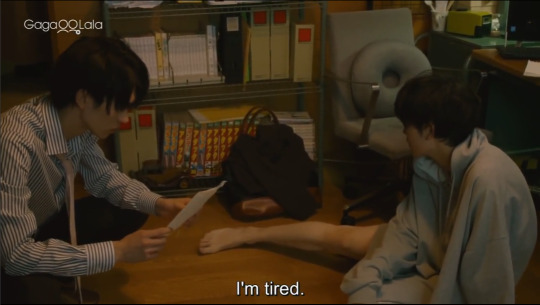
[Y: もう疲れた。あんたといると疲れる。嫌いだ
S: お前 酒入るとめちゃくちゃしゃべるんだな
Y: ねぇ、何で雨の時はだめなの?
S: はあ? だって、お前が言ったんだろう]
Y: (I'm) tired out. When (I'm) with you, (I) get tired. Hate it.
[We've lost the "I" pronouns here, because the emphasis is on the extreme sense of physical and emotional fatigue as opposed to Yoh himself, and on how much he dislikes that feeling. Of note, "hate" here is closer to "detest/really dislike" - the word is "kirai" - which is not as strong as the word "nikui" which we talked about in Ep 1 when Yoh said he hated the part of him that always listened to Segasaki. Also, this is the first time Yoh has addressed Segasaki with the pronoun "you" out loud - he uses "あんた anta", which he also used in his head in Ep 1, after they did it. Again, we'll talk about this in the analysis post in the future, but for now just know that this term is usually used between older couples.]
S: You... once you start drinking you really start talking huh? [literally, you "become able to talk"]
Y: Hey...why is it when it rains, (we) can't do it?
S: What? Because, you said so didn't you? [the last "haa?" from Segasaki! This time expressing his surprise and slight indignation.]
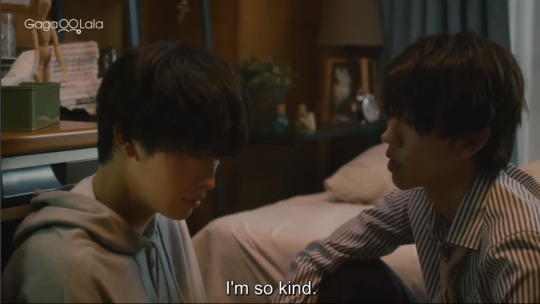
[S: 俺は優しいんだ]
S: I. am. Kind.
Great example of Segasaki's use of the "ore" pronoun here to quite literally emphasise how great he is. "優しい (kind)" in Japanese carries the connotation of being thoughtful, anticipating the other person's needs and wants and then meeting them etc. It's a characteristic that people often say they look for in their potential partners.
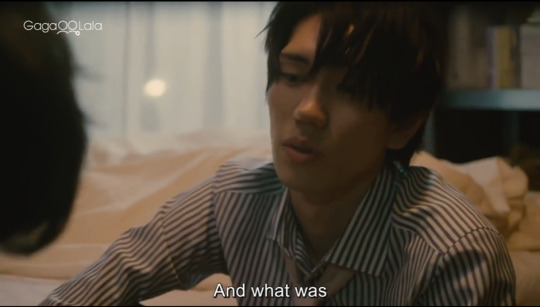
[S: そもそも、なんだ先の言いぐさは
好きじゃないだの 出ていきたいだの
お前 俺のプロポーズを受けといてよくそんなことが言えんな
S: 養ってやる*っつってんだ プロポーズ以外になに]
S: In the first place, what was with those things you said earlier? That you don't like me, that you want to leave...
You... that was rich, saying all that after accepting my proposal.
S: I was saying I'd provide and care* for you. If that's not a proposal than what is?
["養ってやる" is a pretty possessive way to say I'll provide for you - it's the same word used when referring to parent providing for a child, or an owner providing for a small animal. It's not rude per se, but it does imply a power imbalance. Segasaki actually sort of has a point here because... this is not something you say to someone else unless you're in a relationship ^^;]

S: ていうかお前、俺のこと嫌いなんだ
S: どうなの
S: Actually about that... so you hate me huh?
S: Which is it?
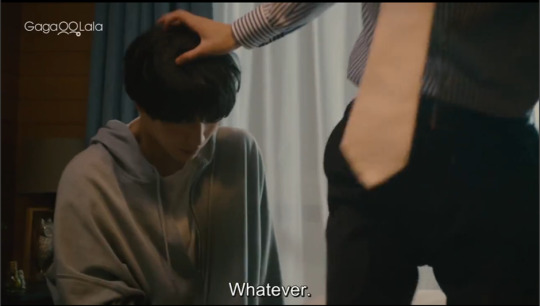
S: ふーん。あ、そ
S: Ohh..? I see.
ふーん (Ohh..?) - Segasaki says this a lot, especially in this episode. This is another one of those sounds that isn't a word but carries a lot of meaning. It has a dismissive sort of tone to it, like you've already assumed something or when you're pretty nonchalant/not impressed about whatever the other person has said and are just playing along with them by giving them some attention (so again, if you use it wrongly, it can piss people off). Segasaki uses it whenever Yoh goes mute or shy, as a way to tease Yoh - though Yoh seems to think Segasaki is dismissing/not interested in his answer.
あ、そ (A, so) - again, Segasaki says this a lot - can be interpreted as "oh really?/I see/is that so?" - Combined with the above, you can see why Yoh often thinks Segasaki isn't interested in his answer, and even when he does recognise it as teasing, he gets too flustered to do anything about it.
This seems to have gotten longer, if you reached the end - congratulations! I hope this makes it a little clearer why it's so obvious to us as the viewer that Segasaki is really quite patient with Yoh, and is waiting for him to come to terms with his feelings, but at the same time so confusing for Yoh, because of the way many of these interactions can be read both ways. In Ep 3, we'll really be able to get into their dynamics because they've got so much more interaction together.
#my personal weatherman#taikan yohou#体感予報#MPW subtitle corrections#mytranslations#finally got it out#doing a breakdown of the argument was very fun#this is like the most indulgent t/n ever#i am indulging myself the same way segasaki indulges yoh#thanks to everyone for reading my indulgent notes#please geek out with me more#these two are so perfect for each other#sorry I wanted to get Ep 3 and the analysis out before Ep 4 but it's not happening
192 notes
·
View notes
Text
“Shut Up and Eat” yakiniku omake — original Japanese dialogue analysis and translation
The 3rd installment of the four-part yakiniku omake series in Mob Psycho 100 involves a bit of clever wordplay to make Mob’s slurring make sense, which means that the translation had to play around with the words a little bit to make it work in English. So, what did Mob actually say in Japanese?
I got the raws from the Manga One app in the Japanese iTunes app store.
I would like to preface this by saying that the most popular translated version, where Mob says the infamous “Shut up and eat” line, is the best translated version in my opinion, because Mob actually slurring that is a totally feasible thing. I’ll explain more about that in the translation notes below, but this version I translated isn’t reworked to match the syllables and make the slurring believable, but rather to try and represent the Japanese meaning.
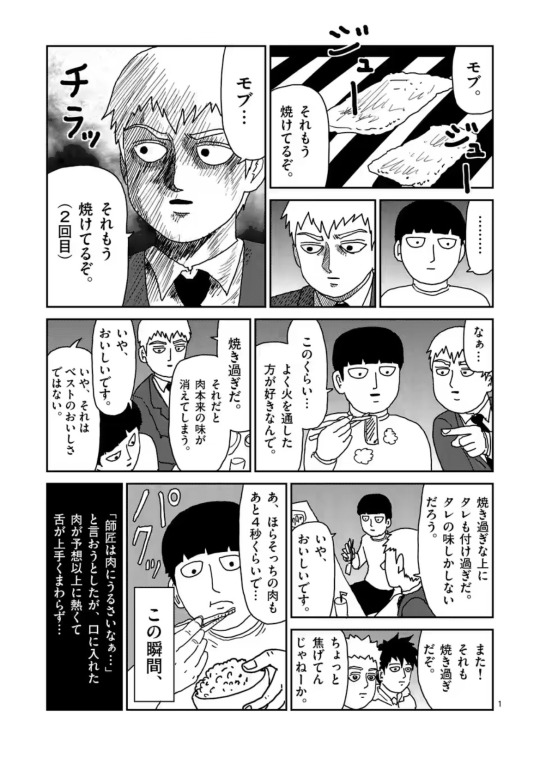
Reigen: モブ。— Mob.
それもう焼けてるぞ。— It’s about to burn!
Mob: ………
Reigen: モブ… —Mob…
それもう焼けてるぞ。(二回目) — It’s about to burn. (A second time)
なぁ… — Hey…
Mob: このくらい…よく火を通した方が好きなんで。— It’s good like this. I like the heat to spread evenly throughout.
Reigen: 焼き過ぎだ。それだと肉本来の味が消えてしまう。—It’s cooking too much. It’s going to completely lose the original flavor.
Mob: いや、おいしいです。— No, it’s tasty.
Reigen: いや、それはベストのおいしさではない。— No, that’s not the best taste.
焼き過ぎな上にタレも付け過ぎだ。タレの味しかしないだろう。— It’s overcooked and you put too much sauce on top.
Mob: いや、おいしいです。— No, it’s tasty.
Reigen: また!それも焼き過ぎだぞ。— Again! That one’s also cooking too much.
ちょっと焦げてんじゃねーか。— It’s a bit scorched, isn’t it?
あ、ほらそっちの肉もあと4秒くらいで… — Ah, look—that piece of meat, in about four seconds…
「師匠は肉にうるさいなぁ…」と言おうとしたが、口に入れた肉が予想以上に熱くて舌が上手くまわらず… — “Shishou is picky about meat, huh…” is what Mob tried to say, but when he put the meat in his mouth, it was hotter than expected and his tongue couldn’t articulate well.
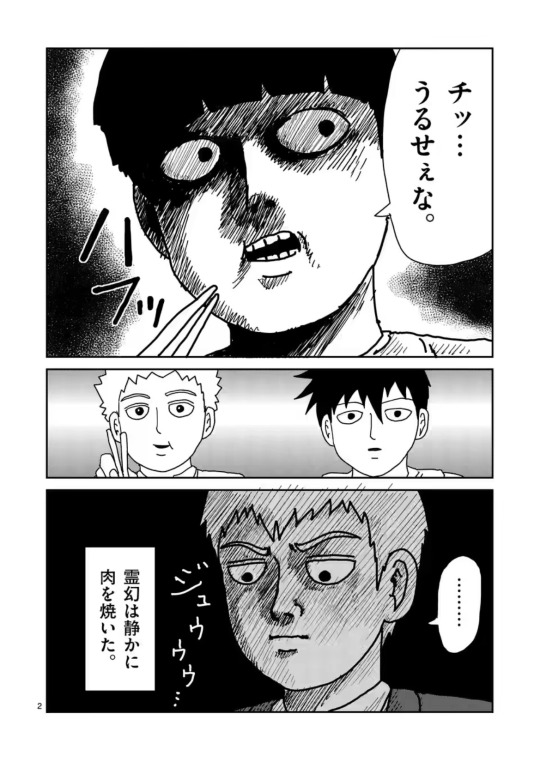
Mob: チッ… うるせぇな。— Tch… Shut the hell up.
Reigen: ………..
霊幻は静かに肉を焼いた���— Reigen cooked his meat in silence.
——————————
Notes:
- Mob: このくらい…よく火を通した方が好きなんで。— It’s good like this. I like the heat to spread evenly throughout.
「このくらい…」 actually directly translates to “This much…” (in regards to how much he’s cooking the meat over the grill). It employs the Japanese technique of “only say half the sentence and let the rest be unspoken”, but that wouldn’t make a lot of sense in English and kind of sticks out translated strictly like that. So I just finished the sentence.
- Mob: チッ… うるせぇな。— Tch… Shut the hell up.
So, this whole thing is a joke about the many uses of the word 「うるさい」 (urusai). 「うるさい 」 can be used to mean “loud/noisy”, “annoying/bothersome”, “picky/fussy/particular”, and “shut up!” when shouted as an interjection. I’ve been in a class in Tokyo where we were all yelled at for talking by our professor, who kept saying 「うるさいだよ!」. In Mob’s originally-intended sentence—「師匠は肉にうるさいなぁ…」—he was using うるさい to mean “picky/fussy”, since Reigen truly would not relax and leave him alone over that meat. But because the meat burned his mouth, he ended up clicking his tongue and slurring 「うるせぇな。」 He dropped the “Shishou” and “about meat” parts entirely, his hurt tongue not moving fast enough and holding out an “e” vowel throughout the latter half of the word instead of raising up into an “ai” sound. This… makes the word very rude. And since all other parts of the sentence were dropped, it also makes it an interjection— a rude and harsh version of “Shut up!”, which I’ve chosen to represent by making Mob curse. (Turning rude conjugation forms into English cursing is a pretty common practice in Japanese translation, as they have more expressive conjugation forms than us and we have no other real way to express that inherent hostility/brashness.)
In the most popularized English translation of this scene, the translators did something very clever to make Mob’s slurring possible, since we don’t have “rude” verb forms in English. What Mob originally wanted to say was, “Shishou sure likes to talk about meat…”, which gets slurred into “Shut up and eat.” The syllables specifically from “shishou” and “about meat” can be slurred into something phonetically resembling “shut up and eat”. I think this is extremely clever and fantastic translation work.
Anyway. Reigen deserved that.
#mp100#mp100 manga analysis#mp100 analysis#mp100 manga#mob psycho 100#shigeo kageyama#mp100 omake#mp100 translation#japanese translation#fan translation#reigen arakata
515 notes
·
View notes
Quote
日本語では一つの名前で表されるのに英語だと二種類以上あるもの
[B! 増田] 日本語では一つの名前で表されるのに英語だと二種類以上あるもの
たとえばつぎのようなもの、というお題。
亀 - Turtle (海亀)、tortoise (陸亀)
ワニ - Alligator, Crocodile
- - - - - - - - - - - - - - - -
はてなブックマークがトリビアの披露大会になっていて、知識が集まってる。
逆パターンも
「英語では一つの名前で表されるのに日本語だと二種類以上あるもの」
- - - - - - - - - - - - - - - -
日本語では一つの名前で表されるのに英語だと二種類以上あるもの
聞く:hear, listen
見る:see, look, watch
海:sea, ocean, waters, marine(海の)
仮説:hypothesis, assumption
罪:crime, sin
(「罪と罰」の罪は以外なことにcrimeのほう *)
英語では一つの名前で表されるのに日本語だと二種類以上あるもの
Museum:美術館、博物館
Requirement:要件、要求
Space:空間、宇宙
- - - - - - - - - - - - - - - -
「総称だけ存在して、細かな違いを呼び分けない」ものと、「総称は無いが、個々の細かな呼び分けだけある」ものに分けられるかも。
総称:亀 / 個々に:Turtle (海亀)、tortoise (陸亀)
総称:皿 / 個々に:dish、plate、saucer
総称:brother / 個々に:兄、弟
- - - - - - - - - - - - - - - -
秋のAutumnとFallのパターンは、意味もニュアンスも同じで、言い方が違うだけかな。
Fallが「秋」「落下」の2つの意味。
- - - - - - - - - - - - - - - -
仕事(taskとworkとjob)
槍:スピア、ランス、ジャベリン、トライデント。/悪魔:デビル、デーモン
managementもadministrationも(場合によってはcontrolも)「管理」、featureもfunctionalityも「機能」
一番有名なのはネズミ(mouse, rat)だと思ってた。他にもphantom/ghost、coast/beach、house/home、college/university、space/universe、earth/globeとか。厳密には意味が違うんだろうけど。
カラスのravenとcrow。
好き(loveとlike)/時計(clockとwatch)/サイン(sign、signatureとautograph)
言語とその話者の世界観が相関することは言語的相対論と呼ばれる。国がcountry, nation, stateに分かれるのは島国と多民族大陸国との違い。https://gijodai.jp/library/file/kiyo2011/yoshitaka_sato.pdf
ApeとMonkey
AlligatorとCrocodileの違いは、口を閉じたときに下の歯が見えるかだって伊豆で習った。
ちょっと違うが、"将来に対する希望"と、"睡眠中の幻覚体験"を日本語でも英語でも「夢 dream」という一語で表現するのは全くもってピンと来ない。
麦は日本語でも大麦・小麦・ライ麦・エン麦は区別はしてるけど、英語ではbarley wheat rye oatで「麦」に対応する単語がないのよね
アプリ開発で Apple の審査担当とやり取りする際「修正」の言い方が複数あって fix, correct, modify, revise, alter などを使い分けてくるので毎回意図を汲みとれてるか不安になる。(まあ日本語にも修正の類語いっぱいあるけど)
「毒」 poison / venom / toxin
romanceとnovel。romanceは通常騎士道物語など物語と訳されるのだけど、小説と訳されているときもある。
CollegeとUniversity
試験: 学力・知識を問う→examination,quiz,test 評価や実験→experiment 試みる→trial▼ただ「試験」で纏められるだけで日本語でも「考査」「実験」「試行」と分けて書くこともできるが。
自由(Liberty,Freedom)。契約などの法律上のやり取りが単語を増やした気もする。
紫→purple,violet
夫、旦那、亭主、主人→husband
足の指(toe)もfinger じゃない
日本語において、髭は全て「髭」で、生えてる箇所を限定する場合は「顎髭」や「頬髭」などと熟語で表現するが、英語ではそれぞれの箇所に単語がある。
リス:squirrel、chipmunk
馬車がとてもややこしくて面倒くさい / 辻馬車 cab, hansom 荷馬車 (horse)cart, wagon, (horse-drawn)carriage, horse and buggy 駅馬車 stagecoach 二輪馬車 curricle, tilbury ,jaunting car ,jinker 馬二輪戦車 chariot まだまだいっぱい…
今話題のsexとgender
政治家 politician / statesman たまご egg / spawn / roe ちなみに逆もあってegg 卵 / 玉子
この手の単語なら調理法が多い。アメリカは焼く文化だ。肉、パン、物で違う(Grill、Bread、Burn、BBQなんてのも)一方で日本は煮る文化だ。煮る、茹でる、炊く、煮込む。英語はBoil、あるいは残り全てはCookだ。
おじさんとおばさん、日本語でもこだわりがある場合には年上か年下で漢字が違うらしい。中国語では母方と父方で別の名前になる。
- - - - - - - - - - - - - - - -
知里真志保によれば、大和民族が川の始まりと考える「みなもと(源)」をアイヌ語では「川の終り」と言うのだという。つまりアイヌは川を海の方から見ているのだと。
コメントで日本語は部位に依らず「髭」だけってあるけど、いちおう漢字だと「髭(くちひげ)」と「鬚(あごひげ)」と「髯(ほおひげ)」で使い分けられる。発音はぜんぶ「ヒゲ」だけど……
- - - - - - - - - - - - - - - -
言語学で言うところの有標と無標も関係してそう。
作家:男女問わず作家の全般、女流作家:作家の中で女性の場合
標識 (言語学) - Wikipedia
英語のlionは雄雌どちらのライオンも表すが、lionessは雌だけである。前者が無標で後者が有標である。
130 notes
·
View notes
Text
Translating the Human Side introductions for Witch's Heart, because I've always wanted to know what they said. If someone else has translated these without DeepL, please let me know.
[ translated with DeepL. ] [ localized by me. ] [ DeepLで翻訳 ] [ ローカライズ ]
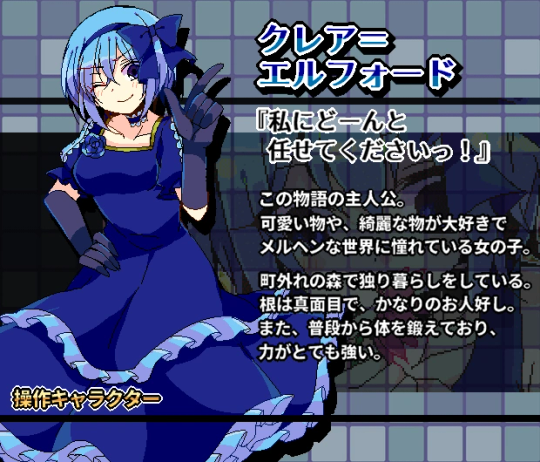
Claire Elford
"I'll take care of it!"
The main character of this story.
She loves pretty and beautiful things,
and longs to live in a fairy tale world.
She lives alone in the forest on the outskirts of town.
She is earnest at heart and quite good-natured.
She also works out on a regular basis and is extremely strong.
and I'll include the Japanese text as well, because there's no reason not to. The golden text [ 操作キャラクター ] is just [ character ].
クレア
エルフォード
『私にどーんと
任せてくださいっ!』
この物語の主人公。
可愛い物や、綺麗な物が大好きで
メルヘンな世界に憧れている女の子。
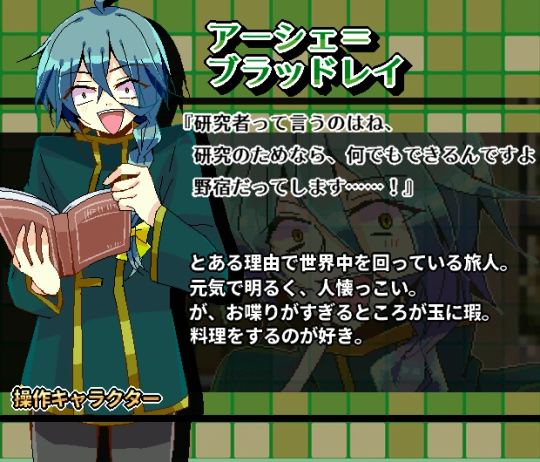
町外れの森で独り暮らしをしている。
根は真面目で、かなりのお人好し。
■また、普段から体を鍛えており、
力がとても強い。
Ashe Bradley
"You know what they say about researchers.
I can do anything for the sake of research.
I can even camp in the wild…………….!"
A man who travels around the world for one reason or another.
He is energetic, cheerful, and friendly.
However, he is a bit too talkative.
He likes to cook.
アーシェ
ブラッドレイ
『研究者って言うのはね、
研究のためなら、何でもできるんですよ
野宿だってします……………!』
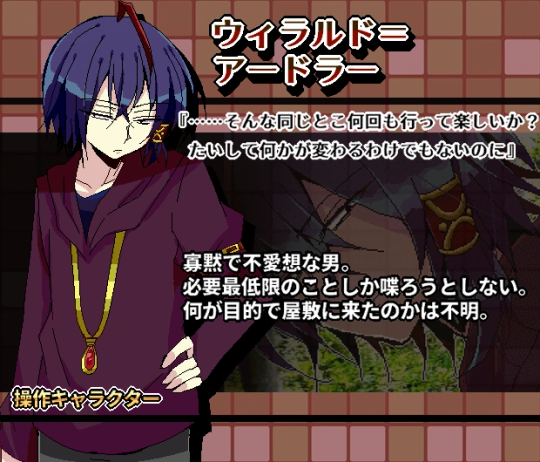
とある理由で世界中を回っている旅人。
元気で明るく、人懐っこい。
が、お喋りがすぎるところが玉に瑕。
料理をするのが好き。
Wilardo Adler
"How much fun is it to go to the same place over and over again?
It doesn't change."
A taciturn, unsociable man.
He only speaks the bare minimum.
It is unclear why he came to the mansion.
ウィラルド
アードラー
そんな同じとこ何回も行って楽しいか?
たいして何かが変わるわけでもないのに』
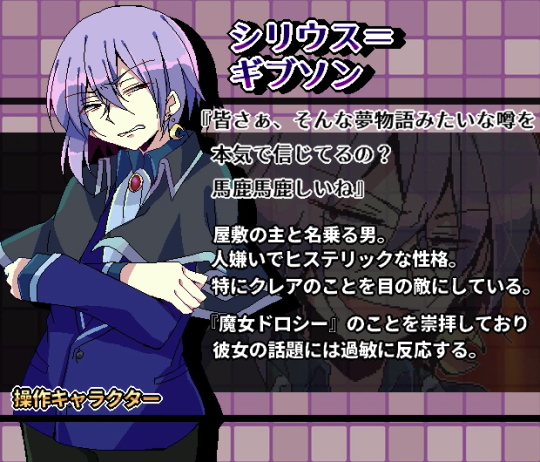
寡黙で不愛���な男。
必要最低限のことしか喋ろうとしない。
何が目的で屋敷に来たのかは不明。
Sirius Gibson
"Do you people really believe those fantastical rumors?
They're absolutely ridiculous."
A man who claims to be the owner of the mansion.
He is misanthropic and hysterical.
He is especially hostile to Claire.
He reveres "The Witch Dorothy",
and is sensitive to any mention of her.
シリウス
ギブソン
『皆さぁ、そんな夢物語みたいな噂を
本気で信じてるの?
馬鹿馬鹿しいね』
屋敷の主と名乗る男。
人嫌いでヒステリックな性格。
特にクレアのことを目の敵にしている。
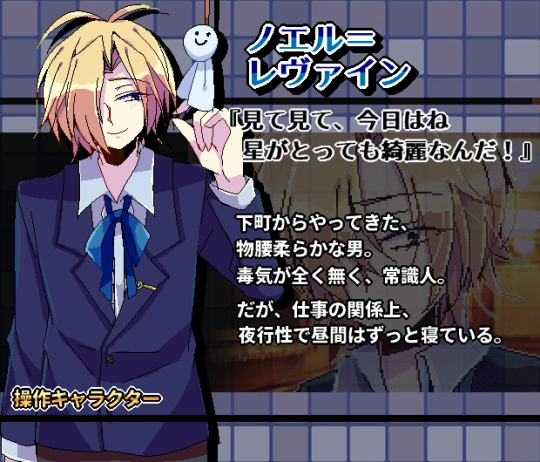
『魔女ドロシー』のことを崇拝しており
彼女の話題には過敏に反応する。
Noel Levine
"Look, look.
The stars are so beautiful tonight!"
A soft-spoken man from downtown.
He is a sensible man with no venom in his voice.
However, due to his work, he is nocturnal and sleeps all day long.
ノエル
レヴァイン
「見て見て、今日はね
星がとっても綺麗なんだ!』
[ Obsessed with Noel being from downtown... And Sirius' hysteria ]
下町からやってきた、
物腰柔らかな男。
毒気が全く無く、常識人。
だが、仕事の関係上、
夜行性で昼間はずっと寝ている。
#witchs heart#witch's heart#claire elford#ashe bradley#wilardo adler#sirius gibson#noel levine#illym translation
21 notes
·
View notes
Text
シスタークラリスの奇妙な一夜
Sister Clarith's Curious Night (Nervous Night)
彼女がそのレストランを訪れたのは
She had visited this restaurant
行方不明の子供たちを探すためだった
To search for some missing children
噂を聞いたのだ
She had heard a rumor
孤児院の子がこの店に入っていくという
That the children of the orphanage had been seen
その姿を見たと
Entering this establishment
.
しかし応対した支配人の男は
But the manager who came to receive her
残念そうに首を横に振る
Regretfully shook his head
「そのような心当たりはありませんね」
"I wouldn't know anything about that"
それを聞いてがっくりと
Upon hearing that, the Sister
肩を落とすシスター
Dropped her shoulders, crestfallen
.
すると支配人は彼女を
When she did, the manager
レストランの一番良い席に座らせた
Ushered her over to sit in the best seat in the restaurant
「せっかくですから
"Since you're here
何か食べていってください
Please, have something to eat
......ああ お代なら結構ですから」
...Ah, it's on the house"
.
ありがたきお言葉
I'm quite grateful to hear that
実は昨日から
The truth is,
何も食べていません
I haven't eaten since yesterday
子供たちが心配で
Out of worry for the children
.
厚意に甘える事にしたシスターの前に
The Sister decided to presume upon his kindness
やがておいしそうな料理が運ばれてきた
And eventually she was brought a delicious-looking meal
白身魚のソテーだろうか それを見て
It looked like a sauteed white fish; when she saw it
彼女は申し訳なさそうに
She apologetically
うつむいてしまった
Cast her eyes down
.
「教えにより
"According to our teachings,
生き物の肉は口にできないのです」
I mustn't partake of the flesh of anything living."
シスターがそう断っても
Though the Sister demurred,
支配人は引き下がらない
The manager was persistent
「そんなことをおっしゃらず
"Now don't be that way,
ここは神の目も届かぬ森の中ですから」
The eyes of your god can't reach you here in the forest"
.
仕方なくシスターは
Reluctantly, the sister
ナイフで魚の身を切る
Cut into the fish's body with a knife
一口だけ食べて帰ろう
She'd just take one bite and head home
そんな風に考えていたところ
But as she was thinking this
彼女は料理の中に
She discovered that
何か固い物がある事に気が付いた
There was something hard inside the meal
.
シスターの顔が青ざめる
The Sister's face paled
それはレーナが身に着けていた
That was a brooch that Lena
ブローチだった
Had always worn on her person
泳ぐのが得意なレーナが
Lena was good at swimming, and
海で集めた小石を
She had made it herself
組み合わせて作った手作りの物だ
By joining together pebbles she'd gathered from the sea
.
どうしてこんな物が
What is something like this
料理の中にあるの?
Doing inside this dish?
少なくともあの子は
At the very least, that child
この場所に来ていた
Must have come to this place
.
ふと気が付くといつのまにか支配人の姿は
She suddenly noticed that the manager
店内のどこにも見えなくなっていた
Was nowhere to be seen inside the restaurant
胸騒ぎを覚えた彼女は思わず席を立ち
With a sense of unease she unthinkingly stood from her seat
店の奥へと忍び込んでいったのだ
And crept further into the back
.
途中の廊下で小さな靴が落ちていた
Partway through the hallway she found a small dropped shoe
シスターは再び青ざめる
The sister paled once again
それはマルクの靴だった
That was Mark's shoe
彼の足が速かったことを彼女は思い出す
She recalled that he'd been a fast runner
.
ひときわ異臭が漏れる扉の前に立ち
She stood before a door leaking a notably pungent odor
シスターは恐る恐るそれを押し開ける
The Sister timidly pushed it open
そこは血と肉のこびりついた調理場
Inside was a kitchen splattered with blood and meat
コックの顔をした男の顔は
The face of the man who looked to be the cook
毛むくじゃらだった
Was covered in thick fur
.
二本足で立つ
You, dog man who
犬の獣人よ
Stands on two legs
包丁についた血は
That blood on your kitchen knife
いったい誰の物?
Just who does it belong to?
.
作業台の上で赤い猫が
On the work counter, a red cat
皿のシチューを舐めている
Was licking up a bowl of stew
浮かんでいる具材は
The ingredients floating in it
間違いなく人間の指だ
Were, without a doubt, human fingers
無数の指の中の一つ
Among the countless fingers
そこにはめられた指輪を
The sister found one
シスターは見つけた
That was wearing a ring
.
あれはエマの物で間違いない
She was certain that it belonged to Emma
恐ろしい想像がシスターの脳裏を駆け巡る
A dreadful image flashed through the Sister's mind
振り返ったシスターの前に立っていたのは
When she turned around, standing before her were
二羽のウサギと巨大な熊だった
Two rabbits and an enormous bear
.
シスターは叫び声をあげ
The Sister let out a scream
その場に倒れこんだ
And collapsed on the spot
薄れゆく意識の中
In her fading consciousness
徐々に迫ってくる絶望の足音
Despairing footsteps steadily encroached on her
気を失う直前 彼女が見たのは
Right before she passed out, she saw
額に角を生やした少女の顔だった
The face of a girl with a horn on her forehead
.
目を覚ました時
When she awoke
彼女は孤児院に帰ってきていた
She had returned to the orphanage
そしてその後
And shortly after
行方不明の子供たちも全員
All of the missing children
無事に孤児院へ戻ってきたのだ
Safely came back as well
.
子供たちは数日間の記憶を失っており
The children had no memory of the past few days
そして とてもお腹を空かせていた
And they were very hungry
レーナやマルクたちが唯一覚えていたのは
The only thing Lena and Mark and the others could recall
フルートを持った
Was a pair of twin rabbits
双子のウサギの姿だけだった
Who had been holding a flute
.
あのレストランは建物ごと
That restaurant, and the building it was in
森の中から姿を消した
Vanished from the forest
まるで最初から
It was as though
存在していなかったかのように
It had never existed in the first place
そして
And
平穏な日常が戻る
Their peaceful days returned
.
子供たちのためにおやつの
While baking some brioche
ブリオッシュを焼きながら
For the children's' snack
シスターはこんなことを考えていた
The Sister began to wonder
.
もしもあの時
If, back then,
出された料理を口にしていたならば...
I had actually eaten any of the meal that had been set out...
私は一体どうなっていたのだろうか?
Just what in the world would have happened to me?
#()songs#()mothy#()E.A.T.#the thing you need to keep in mind is that most of this one is spoken and not sung#unfortunately the music is very good and a big part of it so you are missing out on that a little
55 notes
·
View notes
Text
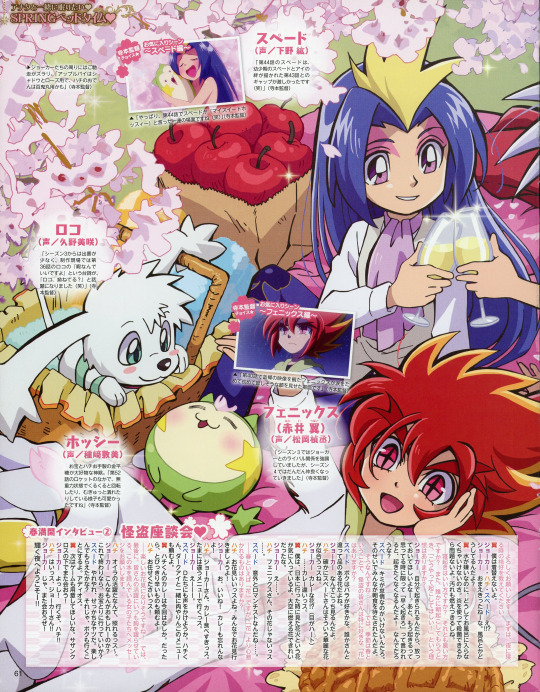

Otomedia Plus + SPRING 2017
(Below is a cleaned up machine translation. Please note that due to the nature of machine translation, the text may not be wholly accurate or may read oddly. Japanese is included after English for reference. The text was lifted from the images using this site, and though there's been care taken to make sure everything is correct, there is a chance of unintentional typos.)
I want to sleep together with you ♡
Spring Bedtime
アナタと一緒に眠りたい♡
SPRING ベッドタイム
~
Character Bio
Joker
(Voice: Ayumu Murase)
By making Joker frustrated with Hosshi, we got to see the Joker's funny, impatient faces in Season 3-4. (Director Teramoto)
ジョーカー
(声/村瀬歩)
「ジョーカーにホッシーへ の苦手意識を持たせたこと で、シーズン3.4ではジ ョーカーの焦った面白い顔 が見れました」(寺本監督)
Hachi
(Voice: Yumiko Kobayashi)
Hachi is now "Hachi the Phantom Thief Apprentice" and is on the same advance notice as Joker, but one day we may be able to call him "Hachi the Phantom Thief". (Director Teramoto)
ハチ
(声/小林由美子)
「今は“怪盗見習いハチ” でジョーカーと一緒の予告 状ですが、 いつか “怪盗ハ チ” と言える日が来るかも しれませんね」 (寺本監督)
Spade
(Voice: Hiro Shimono)
In episode 44, Spade's bond with Ai alongside Spade's childhood was depicted, and the gap between episode 43 and 44 is quite drastic (laughs). (Director Teramoto)
スペード
(声/下野紘)
「第44話のスペードは、 幼少期のスペードとアイの 絆が描かれた第43話との ギャップが激しかったです (笑)」 (寺本監督)
Phoenix
(Voice: Yoshitsugu Matsuoka)
In Season 3, the rivalry between Phoenix and Joker was emphasized, but in Season 4, the two became gradually closer.
フェニックス
(赤井翼) (声/松岡禎丞)
「シーズン3ではジョーカ ーとのライバル関係を強調 していましたが、シーズン 4ではだんだん仲良くなっていきました」 (寺本監督)
Hosshi
(Voice: Atsumi Tanezaki)
Hosshi is a divine beast that loves treasures and Hachi's homemade kompeito. In the rocket in episode 52, the way it spins around and squishes in a gravity-free state was also very cute.
ホッシー (声種崎敦美)
お宝とハチお手製の金平 糖が大好物な神獣。 「第52 話のロケットのなかで、無 重力状態でくるくると回転 したり、むぎゅっと潰れた りしている様子も可愛かっ たですね」 (寺本監督)
Roko
(Voice / Misaki Kuno)
Since season 3 he's had few appearances so at the production site Roko’s line in episode 36, "I'm free so it's okay" became a hot topic, "'Roko, are you sulking?' (laughs)" (Director Teramoto)
ロコ
(声/ 久野美咲)
「シーズン3からは出番が少なく、 制作現場では第 36話のロコの『暇なんで いいですよ』 という台詞が、 『ロコ、拗ねてる?」 と話 題になりました(笑)」(寺本監督)
~
Main
(Top left note) Joker and friends are surrounded by tasty food. The apple pie is for Shadow and Rose, and Hachi's oden is probably for Hyakkimaru (Director Teramoto)
ジョーカーたちの周りにはご馳 走がズラリ。 「アップルパイはシ ャドウとローズ用で、ハチのおでんは百鬼丸用かも」 (寺本監督)
Joker and company have finished their adventures in Season 4 so now we're here. It's Japan in Spring, where the cherry blossoms are in full bloom! It seems that everyone is enjoying Hanami (cherry blossom viewing) while feasting on Hachi's cooking. I wonder what kind of festivities they have in store, Director Yukiyo Teramoto!
"March 13th is Spade's birthday and April 13th is President D's birthday, so this could be a celebration for them as well. The apples may have been a gift from D."
I want to keep watching the peaceful atmosphere of the phantom thieves, but they must be waiting for the next treasure!! Until we see Joker and his friends again, 'smile and au revoir'!
シーズン4での冒険を終えたジョーカーご一行が、本日やって来た場所。それは、桜咲く春の日本! ハチの料理に舌鼓を打ちつつ、みんなでお花見をしているようです。一体どんなお祭り騒ぎになっているんでしょうね、寺本幸代監督! 「3月13日がスペードの誕生日、4月13 日がプレジデントDの誕生日なので、 ふたりのお祝いも兼ねているのかもしれま せんね。ほかのみんなも続々と集まって きて、りんごはDからの差し入れかも」 穏やかな雰囲気の怪盗たちをずっと見 ていたいけど、彼らには次なるお宝が待 っているハズ!! またジョーカーたちに 会える日まで、笑顔でオ・ルボワール!
Spring Blossom Interview with Director Yukiyo Teramoto
春満開インタビュー 寺本幸代監督
Please tell us about the secret story behind the production of the final episode.
最終話の制作秘話を教えてください。
Finishing and shooting lasted all night for about three days, and it seems that I could see hallucinations by the end of it (laughs). I am relieved that we were able to broadcast the content that we were able to show. The trick that the passcode to unlock the missile is "HEART" was thought up by Naohiro Fukushima, in charge of screenwriting. I think the highlight was the scene where Joker writes his name on the spaceship and tells Phoenix, "Be sure to come back." I wonder when he wrote the name, but in the shot of the spaceship just before this scene, the name is obscured by light to disguise it. So the name was already written at that point.
最後は仕上げと撮影が3日間くらい徹夜して、 幻が見えたそうです(笑)。なんとかお見せでき る内容で放送することができて、ほっとしまし た。ミサイルの解除パスコードが 「HEART」 というトリックは、脚本の福島(直浩)さんが考 えてくれました。 ジョーカー的には宇宙船に名前 を書いて「必ず返しに来い」とフェニックスに言 うシーンが、見せどころだったと思います。いつ の間に名前を書いたのかと思いますが、そのシー ンに入る直前の宇宙船が映るカットでは名前を誤 魔化すために光を入れて見えなくしています。な ので、あの時点ではすでに書いてあるんですよ。
What was the most memorable moment for you other than the last episode?
最終話以外で、印象的だったことは?
There is a scene in the end of episode 50 where Spider Ace protects President D from a sniper's bullet and shows him the "DF" ring on his left hand, saying, "I have sworn my allegiance to President D." When the first picture came in, the ring on Spider Ace's middle finger was forgotten, so I asked for the picture to be redone and a ring to be added. Then somehow, I ended up with a picture of Spider Ace with the ring on his ring finger (laughs). The staff around me and I laughed hysterically and rushed to have it fixed.
第50話のラストでスナイパー幻魔の銃弾からプ レジデントDをかばったスパイダー・Aが、「オ レはプレジデントDに忠誠を誓ったんだ」と左手 の《DF》の指輪を見せる場面があります。最初 に絵が上がって来たときスパイダーAの中指に 指輪を描き忘れていたので、リテイクで指輪を追 加してもらったんですよ。そうしたらなぜか、ス パイダーAの薬指に指輪がはまった絵が上がっ て来てしまって(笑)。周りのスタッフたちと大 爆笑しつつ、慌てて直していただきました。
By the way, In this issue, we are looking into the sleeping habits of Joker and his friends! Who among them do you think is the best at getting up early?
ちなみに今号では、ジョーカーたちの睡眠事 情に迫っております! 彼らのなかで、早起きが 得意そうな人物は誰だと思いますか?
Hachi has to prepare food, so I think he wakes up early. It seems that Hyakkimaru is also living a proper life. It seems that Spider Ace, who is in a pumped up state after drinking coffee, will wake up early, but I feel that he will be weak in the morning if he hasn't.
ハチはご飯の支度があるので、早起きだと思い ます。百鬼丸もきっちり生活していそうですよ ね。コーヒーを飲んでヒャッハー状態のスパイダ Aも早起きそうですが、コーヒーを飲んでい ないヘタレ状態だと朝が弱そうな気がします。
Is there a character you would have liked to explore more?
では、もっと掘り下げて描いてみたかったキ ャラクターはいらっしゃいますか?
I wanted to depict how Spider Ace came to be loyal to D. I liked Spider Ace and Detective Wolfe in the original story, and I really wanted to have Detective Wolfe appear in episode 35, but there was no room for him, so I gave up on the idea. I am glad that I was able to create an interesting combination with D and Spider Ace, but I also wish I could have drawn those two in the story. With Dai Sato, who is in charge of the series composition, I was also thinking about a story about Dr. Neo's astronaut days. When he was young, he had a moment when he saw a spaceship that was disguised as a comet for a moment due to the influence of a solar flare, and from that moment he came to believe that aliens existed. It was a shame that we couldn't depict it. Neo knew Silver when he was young, and I wanted to depict that with Purple as well.
スパイダーAがDに忠誠を誓ったキッカケを 描きたかったです。 スパイダー・Aは原作でのウ ルフ刑事とのコンビが好きだったので、本当は第 35話でウルフ刑事も登場させたかったのですが、 入る隙間がなくて諦めました。そのおかげでDと スパイダー・Aという面白いコンビが出来たので よかったという思いもありますが、あのふたりも 描きたかったという気持ちもあります。シリーズ 構成の佐藤 大さんとは、ドクター・ネオの宇宙 飛行士時代のお話も考えていました。若かりしネ オが太陽フレアの影響で一瞬だけ彗星の変装が解 けた宇宙船を見た瞬間があり、そこから宇宙人は いると信じるようになったという設定だったのですが、これも描けなくてもったいなかったです。 ネオは若い頃のシルバーとも顔見知りなので、パプルも交えてその辺りを描きたかったですね。
Finally, please tell us what "Kaitou Joker" means to you, Director Teramoto.
最後に、寺本監督にとって『怪盗ジョーカとは、どんな存在なのかを教えてください。
For me, it is a special work that fulfilled my dream of directing an animated TV series. I myself have loved anime since I was a child, and even now as an adult, there are many works that I still remember as my favorites. There are still many stories I would like to tell from the original work, and if there is an opportunity, I would love to do a sequel. The staff also said that they would like to do a sequel, so I feel that "Kaitou Joker" is a work that is truly loved by everyone.
私にとっては、TVアニメの監督をやりたいと いう夢が叶った特別な作品です。私自身も小さい 頃からアニメが好きで、大人になった今も好きだ ったと思える作品がたくさんありますが、アニメ 『怪盗ジョーカー』を観てくれた子どもたちも大き くなり、いつかジョーカーたちを思い出すことが あるのかなと思うと、すごく感慨深いです。 まだ 原作でもやりたいお話がたくさんありますし、機 会があったら続編もぜひやりたいですね。スタッ フも「続編がやりたい」と言ってくださっている ので、『怪盗ジョーカー』は本当にみんなに愛され ている作品だと感じています。
Spring Blossom Interview 2: The Phantom Thief Roundtable Discussion
春満開インタビュー2 怪盗座談会
Nice to meet you! To start off, what do you dress in at bedtime?
よろしくお願いします! まずは、夜に寝る時の格好を教えてください
Tsubasa: I don't change my clothes.
翼 「僕は着替えないよ。」
Joker, Hachi, Spade: Huh!?
ジョーカー・ハチ・スペード 「え!!!」
Joker: That's so dirty. Do you even take baths?
ジョーカー 「おまえきったねーな。風呂とかどうしてるんだよ?」
Tsubasa: Why should I take a bath if I don't like water? You can use flames to sterilize, so there's no problem. Even the dirt burns off.
翼 「水が嫌いなのに、どうしてお風呂に入らなくちゃいけないのさ。炎を使って殺菌できるか ら問題ないよ。汚れも燃えつきるしね。」
Are you a good sleeper or a bad sleeper? Also, when you ask someone to wake you up in the morning, do you have a vision of how you want them to wake you up?
寝起きはいい方ですか? それとも悪い方 ですか? また、誰かに朝起こしてもらうと き、「こうやって起こしてほしい!」という理 想はありますか?
Joker: I can wake up on my own, so I wish people would stop pestering me. Also, when I'm ready to get up and someone tells me to hurry it up, I don't want to get up! I wonder why?
ジョーカー 「自分で起きられるんだから、放っ ておいてほしいよなー。あと、もう起きるって 思ってる時に限って「早く起きろ」って言われ ると、起きたくなくなるんだよ! なんでだろ うな?」
Spade: It's not good to so lazy. Because of that, everyone had to wait for breakfast.
スペード 「キミが怠惰なのがいけないんだろ。そのせいでみんなが朝食を待たされたんだよ。」
I see... So, since the season is Spring, do you phantom thieves have a particular favorite flower?
そうなんですね・・・・・・では、季節は春ということで、怪盗の皆さんは特に好きな「花」 はありますか?
Spade: I like roses. Unlike some people, I think roses are elegant flowers.
スペード 「ボクはバラが好きかな。誰かさんと 違って品のある花だよね。」
Joker: Why are you looking at me?
ジョーカー「なんでこっち見るんだよ。」
Hachi: Certainly, such gorgeous* flowers suit you, Spade-san.
ハチ「確かにスペードさんはそういう華麗な花が似合うっスね。」
Joker:A 'curry' flower!? (Heart eyes)
ジョーカー「カレーな花?!?(目がハート)」
Hachi: Not 'curry'.
ハチ「カレー違いっス。」
*Gorgeous (華麗), pronounced 'karei', which sounds similar to 'カレー' (karee, curry). The joke lost in translation is that Hachi has said a gorgeous flower, and Joker hears 'curry' because the word sounds similar.
Tsubasa: I like the flower called Hanabi that I saw when I went to Japan. It was a beautiful flower burning in the sky.
翼「僕は、日本に行った時に見た花火という花が気に入っているよ。 大空に燃える花できれい だったな。」
Joker:Huh......
ジョーカー「え······。」
Hachi: Phoenix-san, that isn't a flower.
ハチ「フェニックスさん、その花じゃないっス」
Spade: You're unexpectedly romantic....
スペード「意外とロマンチストなんだね・・・・・・。」
Spring is all about flowers, but is there anything that attracts you more than flowers?
春といえば「花」ですが、「花」より心惹 かれるものはありますか?
Hachi: Cherry blossom viewing is great, isn't it? Let's all go to hanami together!
ハチ「お花見いいっスよね。みんなでお花見行 きましょうよ!」
Joker: Oh, nice! Don't forget the curry!
ジョーカー「お、いいね! カレーも忘れんな よ!」
Hachi: Joker-san, you eat too much curry. I'd like a different menu once in a while.
ハチ「ジョーカーさん、カレー食べすぎっス。たまには違うメニューで行くっス。」
Joker: Ehhh......
ジョーカー「えー――。」
Spade: I'll ask D and the others to join us. Hachi, Dark Eye and I would like to request to have meat and apples on the menu.
スペード「Dたちにも声をかけようか。ハチく ん、ダークアイと一緒に肉やりんごのメニュー も頼むよ。」
Tsubasa: No curry from Hachi this time? In that case, I'll request something extra spicy!
翼「ハチくんのカレーは今回はなしか。だったら、とびっきり辛いものも頼むよ!」
Hachi: Leave it to me!
ハチ「お任せくださいっス!」
It's going to be a fun hanami! Lastly, please give a message to the girls reading this book, who are always excited to read about your great activities.
楽しいお花見になりそうですね!では、最後に。皆さんの活躍にいつも胸を躍らせてい る、この本を読んでいる女の子たちへメッセー ジをお願いします。
Hachi: It's a little embarrassing to hear that I'm doing so well~
ハチ「オイラの活躍だなんて、照れるっス~。」
Joker: Is this really that interesting? If this is the end, can I go find a treasure?
ジョーカー「こんなもんがおもしれーのか? これで終わりなら、お宝とりに行っていいか?」
Spade: Yeesh, he's so impatient. I hope you've had fun. Well, I'll be on my way, too. Adios.
スペード「やれやれ、せっかちなヤツだ。楽しんでもらえたかな? それじゃ、ボクも行くこ とにするよ。アディオス。」
Tsubasa: I hope there's games next time. See you under the Southern Cross!
翼「次はゲームも用意してほしいな。サザンクロスの下でまた会おう!」
Joker: Alright! Let's go, Hachi!!!
ジョーカー「よっし!行くぞ、 ハチ!!!」
Hachi: Yes, Joker-san!!
ハチ「はいっス、ジョーカーさん!!」
Joker: See you next time! Welcome to the Shining Night!!
ジョーカー「じゃ、また会おうぜ!輝く夜へようこそー!!」
27 notes
·
View notes
Text
BNHA 387 Japanese to English Translation + Commentary

火叢は血が濃いんだ
ひむらはちがこいんだ
= “Himura blood is thick.”
Tagline 1:
No.387 煮凝り
ナンバー387 にこごり
= No. 387 Nikogori
煮凝り (romaji: nikogori) is a traditional Japanese jellied broth made by boiling meat or fish bones, scales, heads, and tails to extract a savory nutrient-dense jelly that is then cooled and solidifies due to its high gelatin content. Other gelatins are sometimes added to the mix. After cooling and solidifying, the nikogori jelly is typically used to encase or accent other foods. Unagi nikogori, pictured below, is a dish of eel encased in fish gelatin, for example:
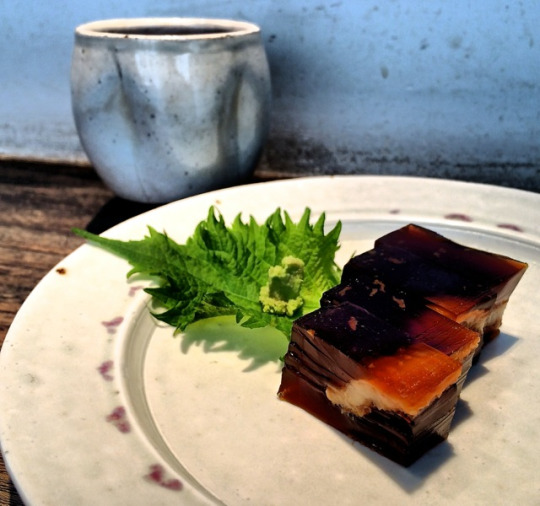
Nikogori is written using two kanji: 煮 (= “burn; boil; cook”) and 凝 (= “freeze; congeal”). In No.351, Touya mocks Shouto by comparing him to the jellied broth, making a pun of the kanji for nikogori and the kanji for Shouto’s name, both of which translate to “burn” + “freeze.” But Shouto doesn’t appear in this chapter, so who, if not him, does the title, Nikogori, refer to? Touya, the other fire + ice broth-er.
Tagline 2:
語るは…
かたるは…
= The speaker…
古くからの庄屋だった火叢は農地改革後も分家を増やす事で財とプライドをなんとか保ってきた
ふるくからのしょうやだったひむらはのうちかいかくごもぶんけをふやすことでざいとプライドをなんとかたもってきた
= “The Himuras, who were village leaders in times of old, managed to preserve their fortune and pride even after [Japanese] agrarian reform by adding branch families.”
Here’s a very, very brief excerpt from a published journal article about the subject:

Japanese agrarian reform “gave land to the landless.” This monumental redistribution of land and associated resources came at a great cost to village heads, called “landlords” by the author, whose power and influence decreased significantly in the years that followed. The Himuras tackled the problems of ongoing land and monetary losses by increasing their numbers through the establishment of branch families (i.e., more members = more opportunities to accumulate wealth for the family and maintain some semblance of their former status).
Tagline 3:
超常解放戦線幹部
ちょうじょうかいほうせんせんかんぶ
= Paranormal Liberation Front Officer
Tagline 4:
外典 個性「氷操」
げてん こせい「ひょうそう」
= Geten, Quirk: “Ice Manipulation”
でも超常が起きると共に加速度的に零落していった
でもちょうじょうがおきるとともにかそくどてきにれいらくしていった
= “Nevertheless, the advent of the paranormal hastened their ruin.”
血が混ざるのを嫌ったんだ
ちがまざるのをきらったんだ
= “They hated mixing blood.”
お家柄と…異形差別��コンボね スピナーが聞いたらなんて言うかな
おいえがらと…いぎょうさべつのコンボね スピナーがきいたらなんていうかな
= “A combination of pedigree and… igyou* discrimination. What would Spinner say if he heard this?”
異形 (romaji: igyou) is the word commonly translated as “heteromorph,” and indeed, it can mean “atypical appearance; atypicality; heteromorphy.” There are two potential hiragana forms for 異形. The first, いぎょう, corresponds to the dictionary meaning “fantastic; grotesque; strange-looking; suspicious-looking” and is the word used by everyone in-series to refer to this class of people.

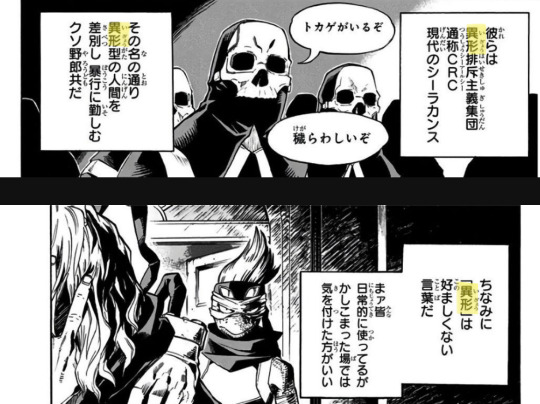


The second, いけい, corresponds to the dictionary meaning “atypical appearance; atypicality; heteromorphy.” Characters like Spinner and Shouji belong to a class of people literally called “grotesque [people].” Caleb’s choice to translate igyou as “heteromorph” understates the violence and prejudice built into the word itself. Functionally, igyou is a racial slur that stereotypes an entire subpopulation as socially undesirable, untrustworthy, and criminal, even monstrous. But if we are to believe that Mr. Compress cares about Spinner as his friend, why does he use it? Because, as Spinner notes in No.220, no one can agree on an alternative word that isn’t offensive.
Tagline 5:
Mr.コンプレス
ミスターコンプレス
= Mr. Compress
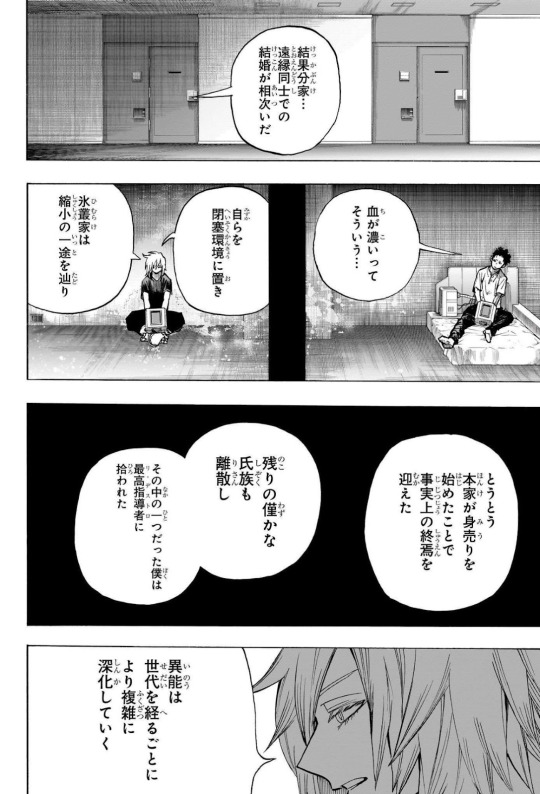
結果分家…遠縁同士での結婚が相次いだ
けっかぶんけ…とおえんどうしでのけっこんがあいついだ
= “As a consequence of [these] branch families… marriages among distant relatives occurred one after another.”
血が濃いってそういう…
ちがこいってそういう…
= “That’s what you meant by thick blood…”
自らを閉塞環境に置き火叢家は縮小の一途を辿り
みずからをへいそくかんきょうにおきひむらけはしゅくしょうのいっとをたどり
= “By placing themselves in a closed [genetic] environment, the Himura family continued to shrink,”
とうとう本家が身売りを始めたことで事実上の終焉を迎えた
とうとうほんけがみうりをはじめたことでじじつじょうのしゅうえんをむかえた
= “and when eventually the main family began to sell themselves [into marriages with members of other prestigious families], it came to a de facto end.”
残りの僅かな氏族も離散し
のこりのわずかなしぞくもりさんし
= “The few remaining families are scattered.”
その中の一つだった僕は最高指導者に拾われた
そのなかのひとつだったぼくはリ・デストロにひろわれた
= “I was one of them and was picked up / taken in by Re-Destro (read as: the Supreme Leader).”
異能は世代を経るごとにより複雑に深化していく
いのうはせだいをへるごとによりふくざつにしんかしていく
= “As meta abilities pass through generations, they deepen in complexity.”
In other words, Quirks have grown more complicated and therefore more difficult to understand and manage with each successive generation. Quirk Singularity is real, BUT NOT EVERYONE EXISTS AT A SINGULARITY. ALL QUIRKS ARE NOT CREATED EQUAL. THE POINT OF QUIRK MARRIAGES WAS TO COMBINE POWERFUL QUIRKS TO EXPEDITE THE SPEED WITH WHICH A PERSON WOULD ACHIEVE A SINGULARITY, TIPPING THE BALANCE OF POWER IN FAVOR OF THOSE WITH THE STRONGEST QUIRKS. EVEN AMONG CLOSE BLOOD RELATIVES, SOME MEMBERS WILL HAVE INHERITED DIFFERENT COMBINATIONS OF GENES PRODUCING DIVERSE RESULTS. IT IS POSSIBLE FOR ONE MEMBER OF A FAMILY TO HAVE REACHED SINGULARITY AND ANOTHER NOT. FUYUMI AND NATSUO ARE NOT SHOUTO, AND SHOUTO IS NOT TOUYA. QUIRK SINGULARITY IS NOT A “GOOD” OR BENEFICIAL THING. AT THAT POINT, A QUIRK BECOMES UNCONTROLLABLE, HIGHLY VOLATILE, AND DANGEROUS TO ITS USER. THE PERSON IS BEING DRAGGED BY THE QUIRK. THEY DO NOT HAVE A QUIRK; A QUIRK HAS THEM.

濃く深く堆積した因子には本人すら知覚し得ない力が眠っているかもしれない
こくふかくたいせきしたからだにはほんにんすらちかくしえないちからがねむっているかもしれない
= “In thickly and deeply layered bodies (read as: [Quirk] factors) may lie latent abilities / power even the person themselves is unaware of.”
だが人は心を置き去りにしたままだ
だがひとはこころをおきざりにしたままだ
= “But people still just abandon their hearts.”
The word commonly translated as “Quirk” is kosei, meaning “individuality; personality; quirk; idiosyncrasy; character; individual characteristic.” By definition, then, Quirks are more than cool special features some people “have” and some people “don’t have.” They’re an expression of the self, a peek into who a person is, their “heart” or “nature.” The Quirk reflects the person as much as the person reflects the Quirk. To deny one’s Quirk is to deny one’s self. To reject the Quirk is to reject the person. Under this definition, and if we think of Quirks as windows into the soul, so-called “Quirkless” people also have a Quirk: being “Quirkless.” If Quirks are manifestations of a person’s individuality or personality, then Quirkless people would be characterized by a weak or nonexistent sense of self (and subsequently, an underdeveloped sense of self-preservation and exaggerated tendency toward self-sacrifice).
明日…何が変わるだろう
あす…なにがかわるだろう
= “Tomorrow… I wonder what [tomorrow] will bring.”
変わる (romaji: kawaru) is a verb meaning “to change; to be transformed; to be altered; to vary (e.g., the weather may be changeable, prone to sudden dramatic shifts).”
Geten assumes the world will be changed by the war and is wondering how it will be different.
さァ次はおまえだ
さァつぎはおまえだ
= “Well, next is you.”
警察・ヒーローと何を話してた?
けいさつ・ヒーローとなにをはなしてた?
= “What were you talking about with the police and Heroes?”
何でもいい聞かせろこの戦いが終わるまでの暇つぶしに
なんでもいいきかせろこのたたかいがおわるまでのひまつぶしに
= “Let me hear anything to kill time until this war comes to an end” or “Anything [you want to tell me] is fine [by me] to kill time until this war comes to an end.”
Geten is anxious about the outcome of the war. He is requesting that Atsuhiro help him fill the silence. Any words will do. All that matters is that he is not left alone with his thoughts.
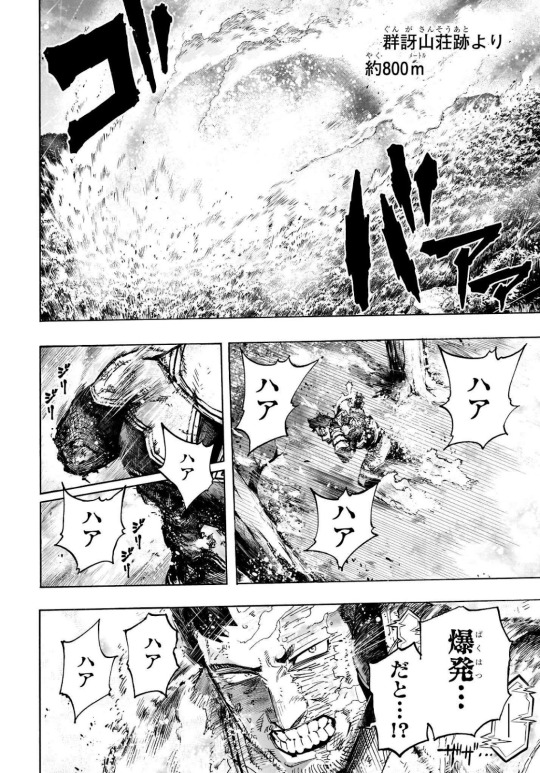
群訝山荘跡より約800m
ぐんがさんそうあとよりやく800メートル
= Approximately 800 [Meters] from the Gunga Mountain Villa Ruins
ハア
Note: This is an onomatopoeia for the sound of heavy panting/breathing. You’ll notice it repeated several times on this panel. Enji is exhausted and struggling.
爆発… だと…⁉︎
ばくはつ… だと…⁉︎
= “Explosion…!?”
This has no real bearing on the translation, but I do want to address it since my translation of this line differs slightly from Pikahlua’s (“An explosion… you say…!?”) and some may wonder why. だと (romaji: dato) is formed by the copula da and the quoting particle to. It expresses surprise or disbelief at something someone has said. Here, Enji is quoting something he has heard (i.e., that any time now Touya will explode, killing them all) and expressing his incredulity at the news. Dato is commonly translated in English as “you say,” but it might also be conveyed simply by the inclusion of an interrobang, that is, the exclamation point + question mark combination at the end of a sentence. Maybe it’s because I write fiction from time to time, but when I am translating, I read the text out loud to hear how it sounds. Sometimes a line sounds better in one language than it does another. To my ears, “explosion… you say…!?” sounds kind of weird and unnatural. How often do you hear a native English speaker speak like that? And yet, native English speakers express surprise or disbelief at something they’ve heard all the time. So, I opted to let the interrobang do the talking. The meaning of the sentence isn’t affected by whether the translator decides to translate dato directly into written form (i.e., “you say”) or not. Context and interrobang are enough on their own to convey that the speaker is shocked by something they have been told.
ハア
Note: This is an onomatopoeia for the sound of heavy panting/breathing. You’ll notice it repeated several times on this panel. Enji is exhausted and struggling.

避難ブロックだけじゃない…
ひなんブロックだけじゃない…
= It won’t just be the evacuation blocks…
今トガの増殖を抑えてるピクシーボブたちもーーー‼︎
いまトガのぞうしょくをおさえてるピクシーボブたちもーーー‼︎
= Pixiebob and the others currently suppressing Toga’s proliferation———!!
いかん…AFO戦のダメージが脚に来ている…!
いかん…オール・フォー・ワンせんのダメージがあしにきている…!
= This is bad… The damage from the AFO battle is spreading to my legs…!
Notice how Enji’s body is drawn: with his right side emphasized (toward us), calling attention to his amputated arm and gouged side. If you recall from No.354, Endeavor sustained a nasty injury not unlike the one that ended All Might’s Hero career. It is the reason All Might regularly coughs blood. These critical injuries are definite parallels, with Endeavor’s injury being to his right side and All Might’s to his left. Mirrors. This is not the first time the two rival Heroes have mirrored one another. During his career-defining encounter with the High-End Noumu called Hood, Endeavor raised his right fist to signal his triumph over his opponent, recreating All Might’s iconic victory pose but with the opposite arm. Unlike All Might, however, Enji also lost his right arm in his fight against AFO and was forced to cauterize his wounds closed, potentially further damaging internal structures and tissues, or else bleed to death on the battlefield. Cauterizing an injury might buy a person time getting to a hospital, but it does not solve the problem of significant blood loss due to amputation and/or maiming, nor does it mitigate the risk of infection leading to the development of sepsis and multiple organ failure. I know, I know. BNHA is a work of fiction and fiction is seldom an accurate representation of reality, but it is worth bearing in mind that Toshinori continues to suffer medically due to his years-old injuries. His survival came at a steep cost, a cost paid by the losses of his career, health, and quality of life. Assuming Endeavor survives the war, he will likely have similar issues.
That Endeavor’s lower half is now being affected by AFO’s mutilation of his upper half suggests that more is going on internally than is apparent. It’s worse than it looks.
これ以上燈矢を誘導して遠くへ向かうには———…
これいじょうとうやをゆうどうしてとおくへむかうには———…
= [I don’t think I can] lead Touya any farther away———...
あっ
= “AH”
お
= “OH”

おどおさん
= “DAAAD,”
見で
みで
= “LOOK.”
見でええ
みでええ
= “WAAATCH [ME].”
Let’s talk about how Touya is speaking, because it is indicative of his collapsing mental state. The first thing Touya says is お父さん (romaji: otousan), meaning “father; dad.” This is the most common and most respectful way for Japanese children to address their fathers, but Touya slightly mispronounces it, softening the harder “t” sound into a rounder “d.” Otousan becomes odousan. He also elongates the “o” sound that forms the middle of the word. So, otousan becomes odouusan. In English, Touya is just saying “dad,” but in Japanese, there is a subtle pronunciation difference that deviates from Touya’s norm, clueing us in that something is wrong.
見て (romaji: mite) is the te-form of the verb 見る (romaji: miru), meaning “to see; to look; to watch; to view; to observe.” It can also mean “to look after; to attend to; to take care of; to keep an eye on.” This word and the concept of seeing or watching plays a pivotal role in the Todoroki subplot, particularly in relation to Touya, Enji, and Rei’s characters, with Touya begging to be seen, Enji and Rei admitting to not seeing him, and Endeavor asking the frightened civilians (and Shouto) to watch him. Something I don’t see discussed enough is the nuance of this word. Yes, it means “to see; to look; to watch” and is usually translated as such, but it can also mean “to look after; to attend to; to take care of (e.g., in a medical or caretaking sense, the way a doctor or nurse does a patient or a good parent does a child).” It is a gross oversimplification of Touya’s character to say he is just “throwing the tantrum of a lifetime because Daddy and Mommy didn’t look at him enough / pay him enough attention.” Touya is asking for more than to be acknowledged. He is asking to be taken care of, to be loved and sympathized with and understood and held and protected in exactly the way every child needs and deserves. “SEE ME. CARE FOR ME.” People need people. Children need their parents. I say this as the oldest sibling who did my damndest to “raise” and shield my younger siblings from the chaos and dysfunction of our household: Siblings are not enough, can never be enough, and can never replace the unconditional love and support of a warm, emotionally attuned parent. Neither can friends or found family. Relationships come in many forms. Love comes in many forms. Healing comes in many forms. But at his core, Touya is still that wounded little boy abandoned and forgotten by his father and mother who needed them desperately and cried out for a decade before self-immolating on Sekoto Peak for anyone to help him because his best childhood efforts to help himself weren’t enough to stop his downward spiral. His every bid for connection fell on deaf ears because his father and mother BOTH lacked the emotional maturity, psychological wellness, knowledge, and skills to support him, and his siblings were children themselves, unable to meet his needs or their own.
Regardless of how we might feel about them as parents (if you are familiar with my posts, you know I have LOTS of strong feelings about that), it is important to recognize that Enji and Rei were themselves wounded children who grew up to be wounded adults who were not supported to become the best versions of themselves. Their chances of raising happy, healthy, well-adjusted children without first doing the work to become happy, healthy, well-adjusted individuals were slim to none. Touya is unique in that he is the only Todoroki sibling not shown to form part of a protective pair during his time in the house. Playing with your siblings is not the same thing as being supported by them. When Touya cried, he cried alone without anyone to comfort him. When Touya burned, he burned alone. When Enji was terrorizing Rei or Shouto, Fuyumi and Natsuo held one another while Rei and Shouto moved to defend and console the other. Where was Touya? We don’t know. He was literally not pictured, an artistic choice designed to render him as invisible to us, the reader, as he was to his family. What we can be certain of is that wherever Touya was, he was crying… and burning. Everyone in the family suffered. Touya suffered differently. He is both a product and a reflection of his parents’ personal failures. Enji has attempted to carry the burden of accountability for Touya’s outcome entirely on his shoulders, as if he alone was the “problem” and the “solution,” but there is one other person who shares that responsibility, and it’s not Shouto. It’s Rei, Rei who is Touya’s mother, his other parent. She, too, failed to nurture, protect, and care for her children, and Touya died and became Dabi as a result of her (and Enji’s!) inadequacies. In No.302, Rei said that everyone in the family would have to “take responsibility for what happened and what happens next,” but she was wrong and shifting blame. It is Rei and Enji who must take responsibility, because it is they who were responsible for Touya, not Fuyumi or Natsuo or Shouto. Hopefully, we’re moving toward them actually doing that. Hopefully.
Circling back to the translation, Touya means to say “miTe.” What he actually says is “miDe.” This is someone who chooses his words carefully and speaks with intention, so it is absolutely cause for concern that he is mispronouncing common words.
Before we move on to the next panel, I want to point something out that would be easy to miss if you’re the kind of person who skims the pages without taking the time to reeeeaaaallllyyyy look at the illustrations.
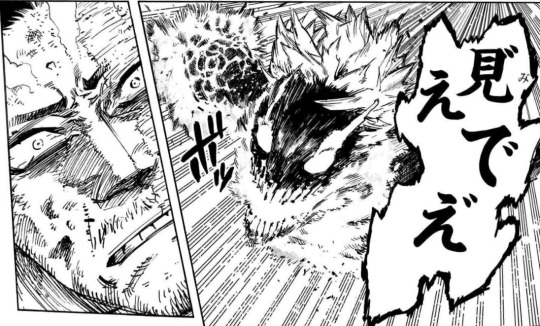
Take a good, long, hard look at Touya’s right arm, the one he’s swinging toward Endeavor. It is literally shattering into pieces as it swings forward. During the post-death cremation process, after which Dabi is named, the body is reduced to its essential elements via exposure to open flame, intense heat (1400-2000°F), and evaporation. The tissues, organs, and fat of the body are destroyed. This is known as primary combustion. During secondary combustion, the inorganic particles that remain after primary combustion, which consist mainly of carbon dioxide and water vapor, discharge, leaving behind bone fragments that are then pulverized into “ashes,” at least in the West. In the East, these pieces of bone are collected and placed in a funerary urn for burial, which may happen immediately or some time after the cremation ceremony (Dabi). Touya is cremating while still alive. Charred pieces of tissue and bone are being thrown from his body with every move. This is not new. This is not something Endeavor, who, for all his running, has yet to attack Touya, did. This is something that was happening from the moment Touya found himself warped to the Kamino Ward with Shouto instead of Endeavor and that Shouto sped along, whether he intended to or not, by repeatedly attacking Touya. If you go back to those chapters, you’ll notice black flecks of burnt skin and other tissues being blasted off of Touya’s body every time Shouto strikes and light peeking through the tiny holes forming in his body. Phosphor was specifically created to protect Shouto (and other Heroes) from Touya’s flames by holding Shouto’s internal temperature steady and neutralizing Touya’s incredible heat, rendering him powerless to defend himself and/or harm others. Every second Touya spent with Shouto pushed him closer to death.
Let’s quickly talk about names and the implications of them. The kanji for Touya’s name are 燈矢, meaning “light; lamp; lantern; candlelight” and “arrow,” respectively. The accompanying hiragana, which tell us how to pronounce the name, are とう (romaji: tou) and や (romaji: ya). These hiragana can also mean “training; education; cultivation,” which is fitting because one of Touya’s defining attributes is his awesome work ethic and commitment to continuous self-improvement. The impression of the name is of something on the climb, soaring high above the clouds, which is also fitting as this is exactly what Enji hoped and believed Touya would do. If you are familiar with the kanji for Shouto’s name, you know they translate to “burn” + “freeze.” Clearly, he was named for his Quirk. For Enji, Touya was person before Quirk, his son; Shouto was Quirk before person, his masterpiece and means to an end. But what of the hiragana for Shouto’s name? These are しょう (romaji: shou), also the hiragana associated with the kanji (= 賞) for “prize; award,” and と (romaji: to). This combination of hiragana bears a striking resemblance to the hiragana for 消灯 / しょうとう (romaji: shoutou), meaning “to put out the light; to turn off the lights.” If Touya = “light,” then Shouto = one who does away with the “light.” As sad as it is and as disturbing as it might be, Shouto’s birth all but guaranteed Touya would die.
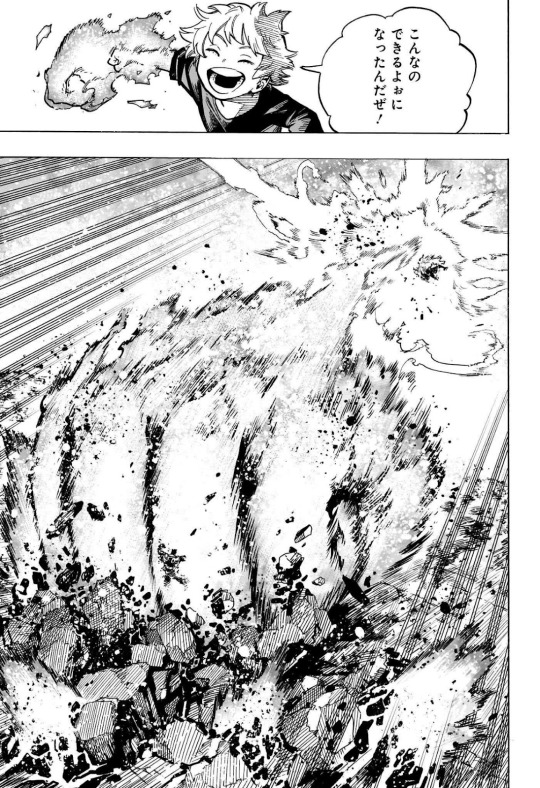
こんなのできるよぉになったんだぜ!
= “I’ve become able to do something like this!” or “I can do this now!”

炎を止めろ燈矢…‼︎
ほの��をとめろとうや…‼︎
= “Stop the flames, Touya…!!”
He can’t, couldn’t if he wanted to. Touya’s Quirk is tied to his emotions. The more panicked he is, the more frenzied his attacks will be. Look how chaotic his movements are. He’s losing his shit.
見でええ みでええ
= “WAAATCH [ME].”
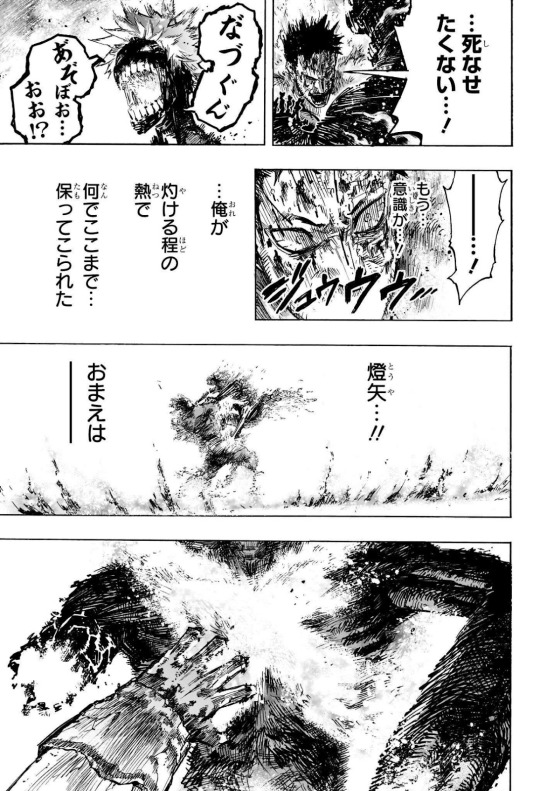
…死なせたくない…!
…しなせたくない…!
= “... I don’t want you to die…!”
なづぐん
= “NATSU-KUN,”
This is also mispronounced. He means “Natsu-kun,” but he says “Nadzu-gun.”
あぞぼお…おお⁉︎
= “LET’S PLAYY…YY!?”
もう…意識が…!
もう…いしきが…!
= [His] consciousness… is already…!
This is Enji realizing that it’s too late for Touya. Once again Enji kept Touya waiting and missed every opportunity (and there have been many) to reach (and “save”) him, allowing himself to be persuaded to entrust Touya to someone else (= Shouto), just like he did when Touya was a child, because it benefitted everyone else more for Touya to be dead last on the Number One Hero’s list of priorities than first. More than anyone, Touya needed his father. More than anyone, Touya hoped his father would come through for him. More than anyone, Touya believed his father would. And more than anyone, Touya’s father has devastated him and taught him again and again that he does not matter. His pain does not matter. His life does not matter. And his (second) death will not matter (just like his first didn’t).
…俺が灼ける程の熱で
…おれがやけるほどのねつで
= … [This] heat is enough to burn [even] me.
The word used here for “heat,” netsu, can also mean “zeal; passion; enthusiasm.”
Let’s put netsu in the context of Touya’s Quirk. Enji said about Touya that he was born with talent and firepower greater than his own. We know from No.301-302 and from No.267 that the strength and intensity of Touya’s flames is influenced by his emotional state. If Enji’s zeal, passion, and enthusiasm [to become superhuman and prove it to himself by surpassing All Might, a “real superhuman”] burned hot enough to blind him to how his family was being impacted, Touya’s burns even hotter. The more desperate Touya becomes, the more destructive his fire will be. His emotions dictate his Quirk, and his Quirk dictates his behavior. Touya does not “possess” a Quirk in the traditional sense, like Uraraka or Kirishima or Mineta do. A Quirk possesses him.
何でここまで…保ってこられた
なんでここまで…たもってこられた
= How has he… endured [the heat and not died] up to this point?
燈矢…‼︎
とうや…‼︎
= Touya…!!
おまえは———
= You———
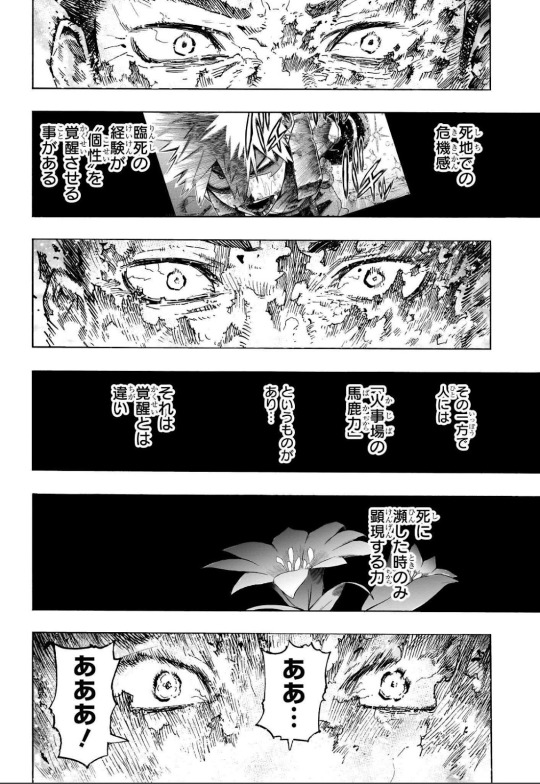
死地での危機感
しちでのききかん
= [A person’s] sense of impending crisis [in the face of] almost certain death.
臨死の経験が"個性"を覚醒させる事がある
りんしのけいけんが"こせい"をかくせいさせることがある
= There have been cases of Quirks being awakened by near-death experiences.
その一方で人には「火事場の馬鹿力」というものがあり…
そのいっぽうでひとには「かじばのばかちから」というものがあり…
= On the other hand, people [have been known to] have something like ‘hysterical strength at the scene of a fire.’
馬鹿力 (romaji: bakajikara) literally translates to “stupid strength.” Several online dictionaries return these additional definitions: “hysterical strength; animal strength; great physical power.” However it is translated, bakajikara refers to the superhuman strength, speed, agility, and endurance that a person might experience under extreme physiological stress to help carry them through a high stakes event, such as being trapped in a burning building or fighting off an assailant. Recently I read a news article (and watched a video) about a family whose apartment caught on fire with the mother and children inside. Neighbors and passersby called for the mother to jump from the balcony with the small child she was carrying in her arms, but again and again she ran back through the flames to retrieve her other children. After dropping the second child to the safety of the civilians down below, she was on fire and dying, but she braved the flames one more time to save her third and final child. Then she dropped dead on the balcony. Her injuries were so horrific, she could not even be visually identified as a biological female. Had it not been for her children clarifying that they were home alone with their mother when the fire started, the police would not have known who she was. But how did she do it? How did she keep moving long enough to save her children, even as she was burning beyond recognition? Love… and “stupid strength.”
それは覚醒とは違い
それはかくせいとはちがい
= That’s different from an awakening.
死に瀕した時のみ顕現する力
しにひんしたときのみけんげんするちから
= [A] power / ability that manifests only when [a person is] on the brink of death.
ああ…
= “Yes…”
あああ!
= “I get it!”

冷の
れいの
= Rei’s
"個性"…‼︎
"こせい"…‼︎
= Quirk…!!
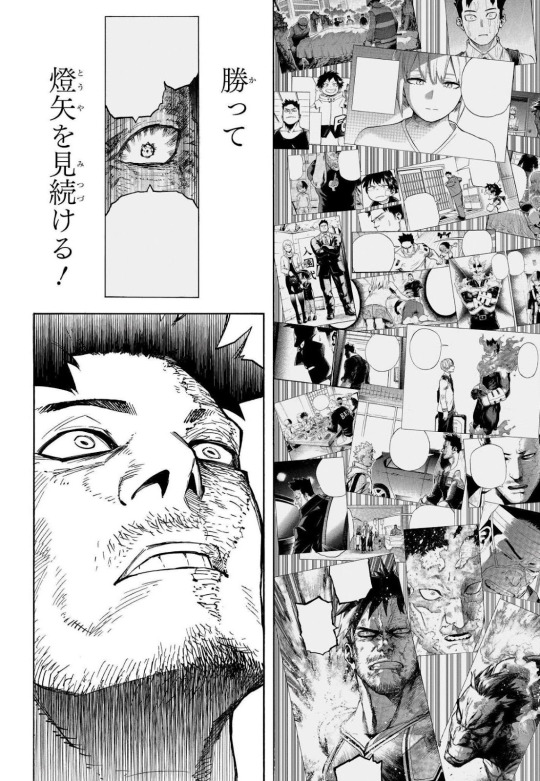
勝って燈矢を見続ける!
かってとうやをみつづける!
= [I will] win and keep seeing / watching Touya!
This is a flashback to No.357 when Endeavor set his intention to defeat AFO and continuously see / look after Touya. It sounds to me like he was hoping to win to save and save to win.

全部俺の責任だ
ぜんぶおれのせきにんだ
= “This is all my fault.”
全部背負って償いに生きねばと思っていた
ぜんぶせおってつぐないにいきねばとおもっていた
= “I thought [that I had] to bear the burden of responsibility for everything and live to make amends.”
でもおまえはずっと俺を見続けてたんだもんな…
でもおまえはずっとおれをみつづけてたんだもんな…
= “But all along you kept watching me, even though…”
おまえを見てやれなかった……
おまえをみてやれなかった……
= “I couldn’t see you……” or “I couldn’t look at you……”
It’s not that Enji didn’t know Touya was suffering. It’s that he didn’t want to know it, because the knowledge that his actions had destroyed his son’s mental health was overwhelming and terrifying and made him feel weak and powerless to do anything but play out the same tired routine day after day to make Touya’s—and his late father’s—destruction mean something. That feeling of powerlessness [probably, almost certainly] reminded him of being a kid helpless to save his father and determined to never feel that way again, so he ran. It was easier to bury his head in the sand and pretend not to see the damage he had done to the person who trusted, believed in, loved, and needed him most. I wouldn’t be surprised if Enji’s relationship with Touya prior to his “death” by fire mirrored his relationship with his own father, another flame-user who also tragically perished in a fire. I especially wouldn’t be surprised if that is the case because that dynamic seems to be implied to be generational in No.356.
But Enji isn’t the only one who turned a blind eye to Touya’s despair. Touya was falling apart emotionally and physically, so Rei abandoned him and the others and attached herself to Shouto, Shouto who never held her accountable for her part in the family dysfunction and still showed promise, promise that ensured Enji would continue financially supporting her and the Himuras so they didn’t have to adapt to the modern era that didn’t reward them for no other reason than that they were Himuras by—I don’t know—getting a job like everyone else who can’t get by on a name alone. Fuyumi coped with her traumatic home life by becoming a person who sweeps problems under the rug, pretends they don’t exist, and implicitly shames others (e.g., Natsuo, Shouto) for not doing the same and “letting bygones be bygones.” The Todorokis, namely Enji, Rei, and Fuyumi, collectively chose to avert their eyes and deny, deny, deny. Natsuo isn’t totally blameless either. In No.302, Natsuo, now an adult and student in the mental health field, remarks that he should have “punched [Enji] and confronted Touya,” a loaded, victim-blaming comment that all but confirms he believes Touya (but not Rei?) also was at fault for the family’s problems. This is not at all uncommon in abusive households, but it is problematic in that it attributes blame as much or more to victims than to perpetrators. And yes, I realize that Rei, too, was a victim and yet I am assigning culpability for her children’s adverse childhood experiences both to her and to Enji, the (primary) perpetrator. The difference is that Rei was an adult, while the children were minors incapable of advocating for themselves or seeking help from external sources. They were dependents forced by age, developmental stage, and a lack of financial resources to rely on adults to meet their needs. Ultimately, Rei, not unlike Enji, was an adult with a responsibility to her children that she failed to uphold.
おまえにも償わなきゃいけなかったんだ
おまえにもつぐなわなきゃいけなかったんだ
= “I needed to atone to you as well.”
No shit? Why is this being treated like some kind of revelation? Wasn’t Enji trying in some small way to do right by Touya by doing right by Izuku, who reminded him of Touya? Wasn’t Enji’s “I will win and continue watching Touya” line a sign that he understood he needed to atone to Touya and how? What are we doing, Horikoshi? It feels like we’re taking one step forward and two steps back.
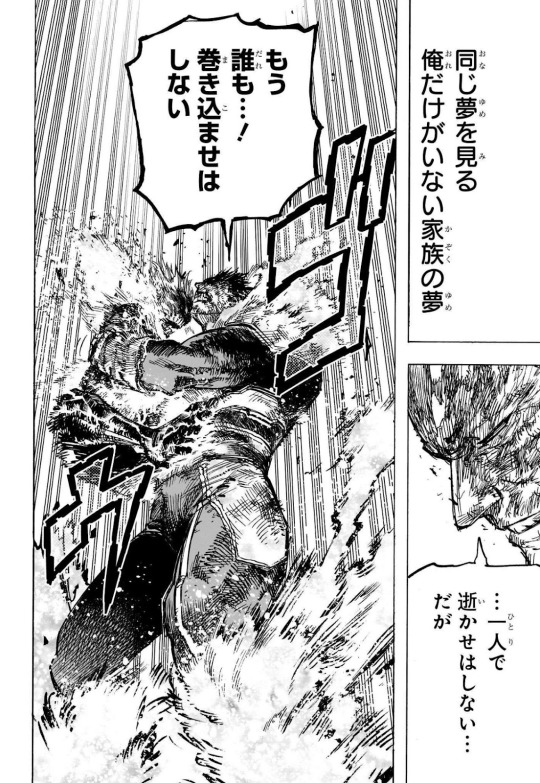
同じ夢を見る俺だけがいない家族の夢
おなじゆめをみるおれだけがいないかぞくのゆめ
= I dream the same dream of my family, but without me.
You might remember this line from No.249, where it or a variation of it appears twice, once at the beginning of the chapter and once at the end of the chapter. Here both scenes are, translated from Japanese into English for your convenience:
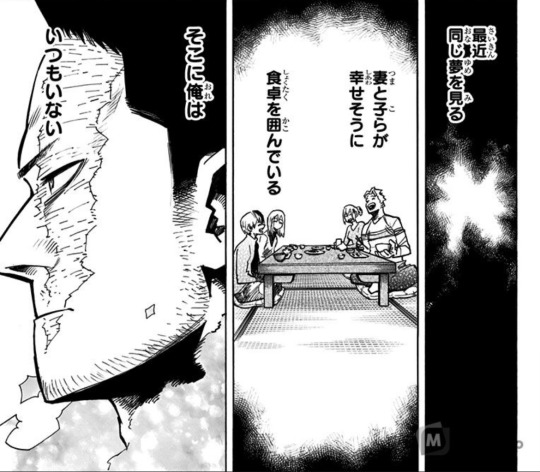
最近同じ夢を見る
= Recently [I] have the same dream.
妻と子らが幸せそうに食卓を囲んでいる
= My wife and children sit happily around the dining table.
そこに俺はいつもいない
= I’m never there [with them].

自分が家の為に今更何ができるのか
= What can I do [at this late stage, when it is already much too late] for the sake of my family?
最近同じ夢を見る
= Recently [I] have the same dream.
おまえもそこにいてほしかった燈矢
= [I] wish you were there too, Touya.
(That concludes our visit to the past. Let's jump back into the translation for No.387!)
…一人で逝かせはしない…だがもう誰も…!
…ひとりでいかせはしない…だがもう誰も…!
= “... I won’t let you die alone… but no one else…!”
巻き込ませはしない
まきこませはしない
= “[We] won’t involve [anyone else]!”
Enji’s plea for Touya to not “involve” anyone else echoes Shouto’s call for the same in No.351-352 (except Shouto added “take it all out on us,” with “us” referring either to the Heroes or to the Todoroki family as a whole). Whether Shouto meant for Touya to direct his anger at the Heroes or at the Todoroki family in its entirety, he did NOT intend to be the only one on the receiving end of it. Shouto intended to limit the damage to himself and some others. Enji intends to limit the damage to just Touya and himself.

地上の移動では間に合わない
ちじょうのいどうではまにあわない
= [They] won’t [be able to] evacuate [the area] above ground in time.
This might also be translated as “[I] won’t [be able to] cover enough ground in time,” as in Touya will explode before Enji can put sufficient distance between the two of them and everyone else to minimize the impact of the blast. He knows Touya is dying and plans to die with him as his father, but as a Hero (and the Number One Hero no less) he is still trying to save lives.
Note: The skin of Touya's chest and shoulders are breaking off. His body now resembles cracked earth disturbed by an underground volcanic eruption.

燈矢 おまえの火力も借りて空に———
とうや おまえのかりょくもかりてそらに———
= Touya, [I am] borrowing your firepower to [launch us] into the sky———
待て…待ってくれ…!
まて…まってくれ…!
= Wait… please wait…!
もう少しだけ———!
もうすこしだけ———!
= Just a little longer———!
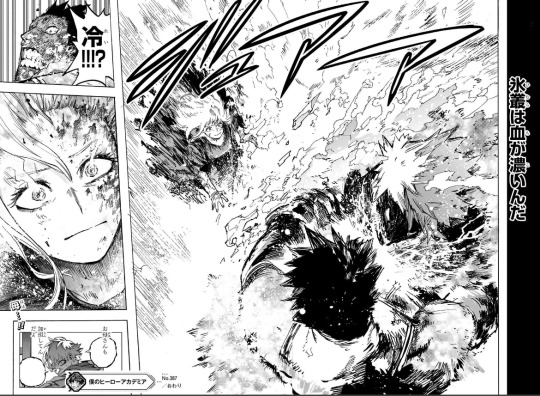
火叢は血が濃いんだ
ひむらはちがこいんだ
= Himura blood is thick.
冷!!⁉︎
れい!!⁉︎
= “Rei!!!?”
This is Enji reacting to Rei’s presence, if that wasn’t clear by the close up of his face followed by hers. If you look closely at the position of Enji’s head on the right side of the panel you’ll notice that he has turned his face toward Rei, away from Touya. His expression is one of shock and horror. This is someone who has just learned that his son will explode, killing everyone within a large radius, from evacuees to Heroes and even other Villains. Everyone caught in the blast will be incinerated. Here he was hoping to save countless lives by limiting the damage to just himself and Touya (not unlike Shouto, who yelled for Touya to “take it all out on us” and not “involve” anyone outside the family), and here Rei is, pushing her way through the flames into the fray. If Touya burns, he, Enji, and Rei will burn together. That fits, because Enji doesn’t actually bear sole responsibility for Touya’s outcome now or then. Rei is his mother, and as his mother, she, too, bears that burden. Enji failed to be a “good enough” father to Touya, and Rei failed to be a “good enough” mother to him. As she said in No.302, she also didn’t see Touya. She also turned away from him. She also abandoned her son when he became more than she knew what to do with. So when he died at thirteen years old after enduring a decade of parental abuse and neglect, his blood was on her hands as much as on Enji’s, because she didn’t do enough to help him when he was at his weakest and most vulnerable. And look, I know Rei had it hard and was suffering, but she still had a responsibility to the children she helped to create to nurture, protect, and care for them, a responsibility she and Enji both fumbled. The sad reality is that parents can love their children and still fail to do right by them. Parents can want the best for their children and still not be the best for them. Touya suffered for having had Enji as his father, and he suffered for having had Rei as his mother. What has happened is on both of them. What happens next is on both of them.
お母さんも
おかあさんも
= “[You] too, Mom.”
Literally, Touya says, “Mom too.”
加担してんだよ
かたんしてんだよ
= “You’re complicit.”
End Tagline:
母…‼︎
はは…‼︎
[His] mother…!!
End.
#bnha manga#mha manga#bnha manga spoilers#mha manga spoilers#bnha 387#mha 387#dabi#touya todoroki#endeavor#enji todoroki#rei todoroki
27 notes
·
View notes
Text
木曜日 2023/10/12
こんにちはみんなさん!
みんなは元気?私はまあまあ。木曜日はあまり好きじゃない。:/
今日のトピック:や、~なければいけません、midterm review
So this past 金曜日 was the midterm. It wasn't that bad and we already got our scores but I wanted to go over our midterm review sheet.
I have a challenge for you! I want you to write down what you think the answer is based on my previous posts. There are one or two grammar points I don't think I've gone over with you, so I'll do that now.
The final grammar points i need to cover are や And ~なければいけない/なきゃいけない
Let's start with や!
や connects two nouns like と except や suggests that the things referred to are proposed as examples and that you are not exciting an exhaustive list. It's similar in the way that たり is used. 練習しましょう。
AやB (A and B, for example)
東京や大阪に行った。I went to tokyo and osaka (and may have visited other places)
おにぎりやラーメンを食べた。I ate onigiri and ramen. (and may have eaten other things)
Honestly there's not much else to it. It's really straightforward!
Next is ~なければいけない/なきゃいけない
This is used to say when something has to/must be done. ねければ is the more formal version and its more often seen in the written language while なきゃいけない is more colloquial and mainly found in the spoken language. To conjugate, you need your verb in the present negative form. For example:
勉強する>勉強しない>勉強しなきゃいけない
作る>作らない>作らなければいけない
歌う>歌わない>歌わなきゃいけない。
待つ>待たない>待たなければいけない
食べる>食べない>食べなきゃいけない
Let's do some practice sentences!
火曜日に日本語の試験(しけん)があるので、たくさん勉���しなければいけません/いけない。Because I have a japanese exam on tuesday, i must study a lot.
もうすぐ母は家に帰るので、車を洗わなきゃいけません。Because my mom is returning home soon, i have to wash the car.
食べすぎたので運動しなければいけません。Because I ate too much, I must exercise.
今、私の双子はフランスに住んでいるので、手紙(てがみ)を送らなきゃいけません。Because my twin is living in France right now, I must send letters.
熱があって、喉(のど)が痛(いた)いので、薬を飲まなければいけません。Because I have a fever and my throat hurts, I must take medicine.
And that's about it! Congratulations reader, you got through (almost) all the genki lessons!! Here's to another successful semester. 頑張れる!!
Let's move on to the midterm review. Do you have your pencil and paper ready? (bonus points if you write the kanji)
Our midterm review was in the format of a story. 始めましょう
You are an exchange student in tokyo. You are on your way back to Tokyo from a one day trip to Oze. The train stopped half way for a while due to a minor road accident. You get bored, so you start talking to a woman/man sitting next to you. The person asks you “where are you from?” how would you say this in japanese?
出身(しゅっしん)はどこですか。
Ask the person has ever been to foreign countries
外国(がいこく)に行ったことがありますか。
The person commented that your Japanese is very good. Be humble like Japanese people and say “No, no. I have to study more”
いいえいいえ。もっと勉強(べんきょう)しなければいけません。/勉強しなきゃいけません。
Go on to say “i want to become better at japanese”
日本語がもっと上手(じょうず)になりたいです。
The train finally starts moving. You ask the person where they are going now. The person says, “I wanted to buy clothes. I'm going home now.”
ふくを買いたかったんです。でも、今から家に帰ります。
The person continues to say, “I need to cook tonight because my mother is sick.”
母がかぜをひいているので、今晩(ばん)料理(りょうり)しなければいけません。/しなきゃいけません。
You ask the person if his/her mother is all right. The person tells you, “she caught a cold and has a fever. But she is okay.”
かぜをひいて、ねつがあるんです。でも大丈夫ですよ。
The person goes on to say, “but she’d better not work today. She should sleep a lot.”
今日は働かないほうがいいですね。たくさん/よく寝たほうがいいですよ。
I wrote down たくさん while my teacher wrote よく and i was a little confused but i think you can use either.
You ask the person what dish you are good at making. The person answers i often make curry rice, pork cutlet, tempura, and so on
よくカレーライスやとんかやてんぷらを作ります。
The person asks you if you cook a lot. Tell the person that “I want to cook more but I am too busy.”
もっと料理したいですが、いそがしすぎます。/いそがしすぎるんです。
The person tells you that they have to do an English homework assignment. You ask the person what they do in class. she/he says, “we read english books, write essays, listen to the news, and so on.”
私たちは英語の本を読みたり、作文(さくぶん)を書いたり、ニュースを聞いたりします。
You ask the person if they practice speaking as well. The person says, “I took the conversation class for a month but I quit.”
一ヶ月間(いっかげつかん)、会話のじゅぎょうをとりました。でもやめました。/とりましたが、やめました。
The person says, “the teacher's english was too fact! But I am interested in English conversation.”
先生の英語は早すぎたんです。/早すぎました。でも、英語の会話にきょうみがあります。
((に)きょうみがあります=to have an interest in)
You offer some help. You tell the person that you can be his/her English conversation partner. You both decide to tutor English and Japanese to each other. You get off the train in a happy mood.
The next day your advisor at school tells you that you looked very happy. Yell your advisor with a lot of excitement, “i met a fantastic woman/man on the train yesterday!! We will practice English and japanese!!” (hint- use んです)
昨日、電車ですてきな女の人/男の人に会ったんです!私たち/いっしょに英語と日本語をれんしゅうするんです。
How’d you do? Comment how much you got! I'd love to see your scores. If You didn't get them, no sweat! A lot of my answers were different from what my teacher wrote..
I want to apologize if these lessons feel rushed. I'm trying to not make them feel that way.
じゃあ、皆さん、お疲れ様!!
今日の歌は&TEAM - UNDER THE SKINです。
Notice any errors? Lmk!! I always want to fix my mistakes so I can learn better. ありがとう!
12 notes
·
View notes
Text
日本のみなさん、こんにちは!
英語で書かれた海外ファン作品に戸惑ったことのある方は少なくないと思います。
この記事では、外国人の漫画アニメファンが、SNSにおいて自分の作品(小説、漫画、イラスト、アニメ等)を通して、ファン同士どのようにコミュニケーションをとっているかを分かりやすく解説しようと思います。
今回は食べ物に関する用語です!
けっこう頻出用語なので、満腹になりたい人におすすめの内容です。
イラストアカウントなのにfoodという単語を見た経験はありませんか。ファン同士の使うFoodという用語は、「作品の作り手が相手に見せるもの」を意味することがあります。これには、イラスト、同人誌、アニメーション、ビデオエッセイ、二次小説はもちろん、評価、批評など、あらゆることが含まれます。
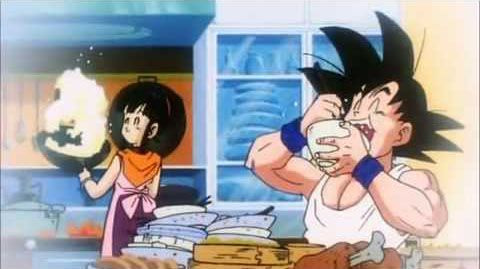
作品を作っている準備段階のことCooking(料理中である)あるいはin the kitchen(台所にいる)という場合もあります。cooking の短縮形cookin'が使われているかもしれません。

例) I’m cooking the next panel now. (いま次の漫画の原稿描いてるところ。)
Hungry (腹ペコ)を使って、
I hope you're hungryというと、「あなたがお腹が空いているといいな」つまり「(今制作中のものについて)楽しみにしていただけると嬉しいです」「乞うご期待」といった意味になります。他にも、
I'm preparing good food, y'all hungry? (良い作品を準備中なのでお腹を空かせて待っててね)という表現は、クリエイターが現在準備しているものについて、フォロワーやファンをからかうときによく使われます。

何かのイベント前にはfeastという単語がよく見られます。feastは、「ごちそう」という意味ですが、ニュアンス的には「いきなりたくさんの食べ物が出る」感じです。
例えばサイヤの日(3月18日)が近くなったら、"Prepare for the feast!"みたいな感じで伝えると盛り上がります。

R18(英語ではNSFWの表記が一般的)のコンテンツに感想を言いたい時は、spicyやhotが使えます。スパイシーと聞くと辛口評価を連想するかもしれませんが、そのような否定的な意味はなく、自分にとってキャラクターやシチュエーションが魅力的すぎる時に使う用語なのです。”It’s hot(spicy) food, I’m so thirsty now" などと言って、口渇を覚えるほどホットであると表現することもあります。👄や👅や💦などの絵文字を使ってもいいです。
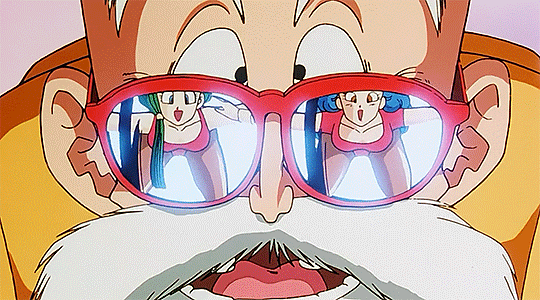
また、料理人(クリエイター)が料理(作品)を作るために使用する材料、すなわち、美術のテクニックやストーリーのアイデア、独創的なコスチューム、などについて話していることもあります。
例えば、公式ストーリーやキャラクターがちょっと理解し難かったり予想外だったりすると、以下のように「ちょっと待て、俺に料理させろ」と言って、ファンならではのアイデアで二次創作することがあります。hollup は hold up の短縮形で、「ちょっと待って」"という意味です。


(source)
例:
絵師: Uhmmm, I want to do a Cell-but-human design… (うーん、人間ぽいデザインのセル描こうかな)
フォロワーA: Oh, noooo! lol Don’t do it!(マジかw やめてー)
フォロワーB: No, wait, let him/her cook. (いやいや、描いてみたらいいじゃん)
その他、WIPという表記とともにプレビューやドラフトを投稿しているのを見かけることがあります。これはwork in progress、つまりクリエイターが、作業中の内容をフォロワーに見せている場合です。フォロワーは、待ち切れないということを伝えるために、よく以下のようなリプをすることがあり、これは英語圏では全く失礼なことではありません。

辛抱強く待つ
"I'm at the table. Smells delicious!" (テーブルに着席中。おいしそうな匂いがするわー)
"I'm starving (hungry), serve me!"(お腹空いたんですけど、何か出してー!)
“Serve the food!" や "Cook faster!"といったバリエーションもあります。
公式が出しているもの、特にシリーズ物については、こんな表現をすることがあります。
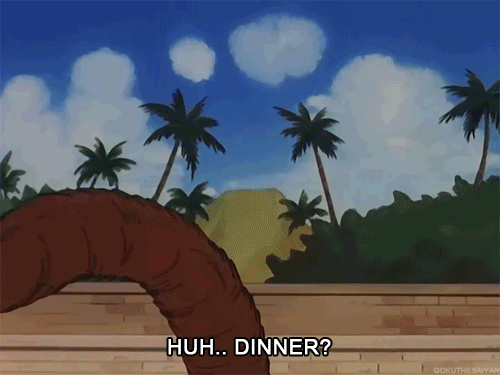
"What is Toyotaro cooking?!"(とよたろう先生は何を作っているのだろう)
これは、驚きと戸惑いを表現したい場合に使います。
"SDBH's food is delicious this week!" (今週のSDBHのエピソードはおいしいよ)
これは、まだ読んでいない人にお勧めする場合に使えます。
時には、自分の感情を表現するために、GIFやさまざまなリアクション画像を投稿する人もいます。

日本人には少し刺激的かもしれませんが、腐った食べ物、まずそうな食事など、ネガティブな画像を使うこともあります。
ネット文化になった料理番組や有名シェフもたくさんいます。中でも欧米で大人気の3ツ星シェフ、ゴードン・ラムゼイは、キレのある毒舌で有名で、テレビにもよく出ているのでご存知の方も多いのではないでしょうか。

これは、ラム��イが残念な料理をさんざん食べさせられ失望し嫌気がさしていたところへ、ついに超絶品料理にありくことができてホッとしている様子を表しています。外国人はよく、「Finally some good fucking food」と言って長い苦しみからついに解放されて得た喜びを表現することがあります。
これをファンの創作作品の下にコメントすると、こういう意味になります。
「公式にはホント失望させられたけど、二次創作のおかげでやっと満腹になった!」
欧米ならではのユーモアのある辛口コメントですね。
ドラゴンボールでは食べ物にまつわるダジャレが多く登場し、英語圏の人もすでにそれをわかっているので、食べ物に関する話題を通して、ファン同士より楽しむことができますね。
海外ファンはネットに投稿された作品に躊躇なくコメントします。しかし、自動翻訳機を使っている場合、スラングを上手く訳せません。
もし日本の皆さんの中で、外国人が何を言っているのか、褒められてるのかディスられてるのかすらわからなくて困っている場合は、いつでも私に聞いてください。私はスペイン語、フランス語、英語に対応可能です。ポルトガル語やイタリア語も大丈夫です。
お役に立てたなら幸いです。
Von~
@aolihuiさんには、このテキストでとても助けられました、ありがとうございました!
25 notes
·
View notes
Photo

✿ 新玉ねぎとスプラウトの酢納豆マリネ
✍️ バルサミコ酢,砂糖大1/2
#cook:主菜#cook:納豆#cook:バルサミコ酢#cook:ブロッコリースプラウト#cook:オリーブオイル×砂糖×酢×にんにく#cook:オリーブオイル×砂糖×にんにく×バルサミコ酢#cook:ミニトマト#cook:たまねぎ#cook:砂糖×酢×にんにく#cook:砂糖×にんにく×バルサミコ酢#cook#cook:2020〜#2020〜
4 notes
·
View notes
Text
vocab pt. 4 from 夜カフェ!
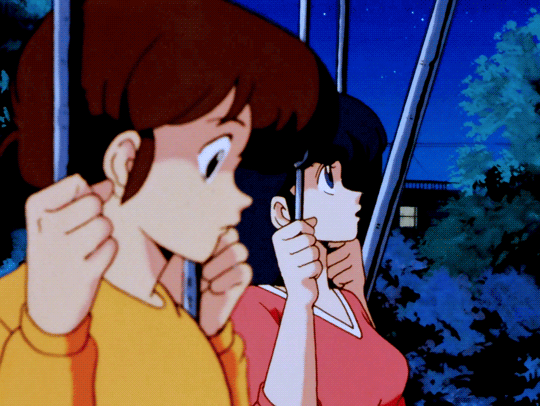
hi friends! this is going to be the last 夜カフェ vocab list, since i just finished the book!! stay tuned for what book the seitokai discord chooses next :)
nouns:
苦笑い(にがわらい) = bitter smile, forced smile/laugh
ブランコ = swing (on playground)
ガリ勉(べん) = studying hard, cramming; person who studies hard
修復(しゅうふく) = restoration, repair
物分かり(ものわかり) = sympathy, wisdom, perceptiveness
沈黙(ちんもく) = silence, hush
八つ当たり(やつあたり) = venting one’s anger, taking one’s anger out on
発散(はっさん) = letting out (feelings), venting
張り紙(はりがみ) = poster
猛練習(もうれんしゅう) = very intensive training
息遣い(いきづかい) = breathing, respiration
作り笑い(つくりわらい) = forced laugh/smile
興奮(こうふん) = excitement
募集(ぼしゅう) = recruitment, taking applications; raising (funds, etc.)
食卓(しょくたく) = dining table
兄弟喧嘩(きょうだいげんか) = quarrel between siblings (n.b. rendaku!)
間際(まぎわ) = the point just before, the verge of happening
悲鳴(ひめい) = shriek, scream
怒鳴り声(どなりごえ) = angry voice
ショウガ = ginger
ニンニク = garlic
甘味(あまみ) = sweetness, sugary taste
中火(ちゅうび) = medium heat (cooking)
調味料(ちょうみりょう) = seasoning
ふくれっつら = sulky look, sullen look
シュシュ = scrunchie
ろうそく = candle
拍手(はくしゅ) = clapping, applause
封筒(ふうとう) = envelope
内緒(ないしょ) = secrecy, confidentiality
半泣き(はんなき) = about to cry, on the verge of tears
verbs:
見開く(みひらく) = to open one’s eyes wide
しかめる = to screw up (one’s face), furrow (one’s brow)
すくめる = to shrug (one’s shoulders)
たまる = to collect, gather, accumulate, save up
ごく = to swing (a swing); to pedal (a bike)
へばる = to be exhausted, worn out
項垂れる(うなだれる) = to hang one’s head
平らげる(たいらげる) = to eat up completely
はしゃぐ = to make merry, frolic
ひがむ = to be jealous, envious; to have an inferiority complex
からかう = to tease, make fun of
張り切る(はりきる) = to be in high spirits, eager
ふるう = to muster, rouse up
グレる = to stray from the right path, go wrong
街並み(まちなみ) = townscape
adjectives:
生ぬるい(なまぬるい) = lukewarm; half-hearted, vague
偉そう(えらそう)な = self-important, pompous, conceited
生意気(なまいき)な = impertinent, cheeky, impudent
積極的(せっきょくてき)な = active, proactive
照れ臭い(てれくさい) = embarrassing, awkward
慎重(しんちょう)な = careful, prudent, deliberate
切ない(せつない) = painful, heartrending
甘辛(あまから)の = sweet and salty
得意気(とくいげ)な = proud, elated
adverbs/onomatopoeiae:
恐る恐る(おそるおそる) = fearfully, timidly, gingerly
ドキマギ = flustered, embarrassed
ぼそっと = absent-mindedly, idly; in a whisper
しげしげと = frequently; fixedly, steadily
がっかり = to be disappointed, dejected; to feel exhausted
ズバリと = decisively, boldly, once and for all
ぼーっと = in a daze, vacantly
ウキウキ = cheerfully, buoyantly, in high spirits
たまたま = accidentally, by chance
ガバッと = all of a sudden, emphatically
ジメジメ = damp, humid, muggy; gloomy
じっとり = damp, moist (negative nuance)
ぼんやり = indistinctly, vaguely
トボトボ = totteringly, trudgingly
ほんのりと = slightly, faintly
expressions:
胸(むね)を張る(はる) = to throw out one’s chest
当て(あて)にならない = unreliable, not to be counted on
〜まくる = to do over and over again; to do with reckless abandon
〜につれ = in accordance with
〜済み(ずみ) = arranged, taken care of
#seitokai#vocab#japanese#langblr#日本語#i can't believe i'm finally done with this book#it's been three months and somehow it feels even longer#i'm so excited to see what we'll read next!!#sasha.txt
96 notes
·
View notes
Text
Words from Nukoduke, vol. 4, part 4
Words in bold are particularly relevant to the story, and words in italics seem like they’d be worth remembering outside the context of the manga. Bold and italic together means they’ve probably appeared somewhere in Nukoduke more than once. Kinda long list but it’s for a whole volume… actually it’s too long for tumblr, so splitting into four parts.
供え物 そなえもの offering (e.g. to the gods), votive offering / ofrenda
誠実 せいじつ sincere, honest, faithful / sincero, honesto, fiel
重視 じゅうし regarding as important, attaching importance to, taking a serious view of, putting emphasis on / importancia
作務衣 さむえ, さむい samue, monk's working clothes
匂わせる, 臭わせる におわせる to give off (a smell, scent, aroma), to smell of, to perfume (a room, etc.), to hint at, to suggest, to insinuate
天然 てんねん nature, spontaneity, natural airhead / natural (belleza, gas)
未亡人 みぼうじん widow / viuda
純文学 じゅんぶんがく pure literature, belles-lettres
茶葉 ちゃば tea leaf, tea leaves
ようやっと finally, at last, at length, barely, narrowly, hardly, only just
威圧感 いあつかん intimidating air, sense of intimidation
人望 じんぼう popularity
嬉々, 嬉嬉, 喜々, 喜喜 きき merry, joyful, gleeful / contento, satisfecho, alegre
引っかく, 引っ掻く, 引掻く ひっかく to scratch, to claw / arañar, rascar, rasguñar
野性 やせい wildness (plants, animals, etc.), uncouth, rough, unpolished / silvestre, salvaje
看板娘 かんばんむすめ pretty girl who attracts customers to come inside a shop
ぴちぴち, ピチピチ bursting with youth and energy (esp. young woman), vivaciously young, spunky, energetic, (fish) jumping around energetically (e.g. when caught in a net), bursting (e.g. seams), tight, splattering (e.g. cooking oil)
男勝り, 男まさり おとこまさり (of a woman) strong-minded, spirited, mannish / (de una mujer) mentalidad fuerte, animada, hombruna
舎弟 しゃてい one's younger brother, underling (e.g. in yakuza), junior male peer, sworn younger brother
寡黙 かもく untalkative, quiet, taciturn, reticent, uncommunicative / callado, tímido
女房 にょうぼう, にょうぼ, にゅうぼう wife (esp. one's own wife), court lady, female court attache, woman who served at the imperial palace, woman (esp. as a love interest) / esposa
僭越ながら せんえつながら by your leave, with your permission
ちまちま small, compact
狭き門 せまきもん the strait gate (in the Bible), the narrow gate, high barrier (to enter a highly competitive school, company, etc.), difficult hurdle, difficulty, obstacle
ひた隠し, 直隠し ひたかくし hiding at all costs, desperate cover-up, doing one's best to keep (something) secret
ひた隠す, 直隠す, ヒタ隠す ひたかくす, ヒタかくす to cover, to cover up
独学 どくがく self-education, self-instruction, self-study / estudiar de modo autodidacta, autoaprendizaje
快諾 かいだく ready consent
厳格 げんかく strict, severe, stern, rigid, rigorous, tough / serio, duro, severo, inflexible, rigor, austeridad
涙腺 るいせん tear gland, lacrimal gland
資格 しかく qualifications, requirements, capabilities / calificaciones, requerimientos, capacidades
暴挙 ぼうきょ violence, reckless action, (an) outrage
古株 ふるかぶ old-timer, veteran, senior, old stump, old roots
息抜き いきぬき taking a breather, relaxation, vent hole
吹き出す, 噴き出す, 吹きだす, 吹出す, 噴出す, 噴きだす ふきだす to spout out, to spurt out, to gush out, to jet out, to sprout, to bud, to burst into laughter, to blow (smoke, etc.), to send out shoots (of a tree) / brotar, soplar hacia afuera, empezar a soplar
実体験 じったいけん real experience, actual observations
天才肌 てんさいはだ (person) seeming like a genius, (having) the temperament of a prodigy
急ぎ足, 急足 いそぎあし fast pace, quick pace
#these are almost all from the author's note#this one's all about how the author became a mangaka it's very sweet#Nukoduke#vol 4 part 4#vocab#Japanese in manga#I think vol 4 is when it starts to really get good (at least when I started to get more attached to it)
5 notes
·
View notes
Text
Stir-fried hijiki with wolfberries (cooking)

Hijiki is one of the seaweeds found in the waters around Japan. A must for traditional Japanese food. For Japanese people, the taste is convincing. They are mostly sold as dried foods, so they are soaked in water, rehydrated, and fried in sesame oil, sugar, and soy sauce. The fried tofu, which has been drained of oil, and the colorful red wolfberries are stir-fried together.
Note: In the past, arsenic was detected in hijiki, causing a big fuss in Japan, but it was shown that it is also an essential nutrient, and the fuss subsided.
ヒジキ炒めクコの実添え(料理)
ヒジキは日本近海で採れる海藻の一つ。伝統的な日本食には欠かせない。日本人には、納得の味。おおむね乾物で売っているので、水に晒して戻し、ごま油、砂糖、醤油で炒める。油抜きして刻んだ油揚げと、色どりに赤いクコの実を合わせて炒めた。
注:以前、ヒジキに砒素が検出されて、日本では大騒ぎになったが、必要な栄養素でもあることが示され、騒ぎは沈静化した。
(2023.03.26)
9 notes
·
View notes
Text
レポート 親子で参加!農業体験ミステリーバスツアー
夏休み企画の「農業体験ミステリーバスツアー」があり、8月6日(日)に息子と参加しました。
到着まで目的地は秘密。「農業」といっても、米も野菜も畜産もありますから、どこに向かうのかドキドキ。
結果から申し上げると、今回は、オーガニックの卵を生産する養鶏所と、最先端の植物工場、を見学したあと、農産物加工品のお買い物を楽しんで、最後に地元食材をたっぷり使ったスペシャルランチを食べました。詳細は下記からどうぞ!
一ヵ所目「ファーム アグリコラ」
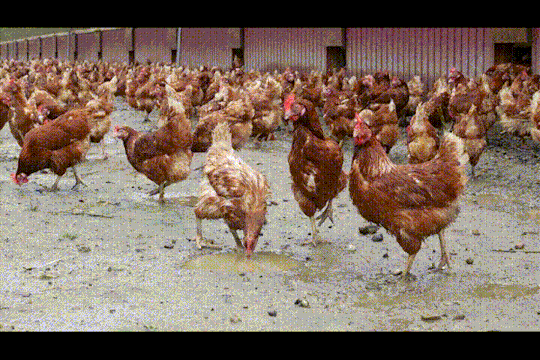
ファーム アグリコラは、札幌の隣町「当別町」にある養鶏所です。代表の水野さんが、アグリコラの特徴や、大切にしていることを話してくださいました。
アグリコラのこだわり01「飼料も国産オーガニック」
日本の飼料はほとんどが輸入。輸入飼料の大豆やトウモロコシは一般的に、遺伝子組み換えが使われています。アグリコラの特徴は、輸入飼料ではなく、国産飼料を使っていること。近隣の有機栽培をしている生産者と連携しているそうです。
また、人間と同じくニワトリも、腸内環境を良くすることが重要だそうで、サツマイモを発酵させた餌も食べさせています。
見た目ウケのために黄身の色を濃くしないので、飼料に着色料を混ぜたりもしていません。
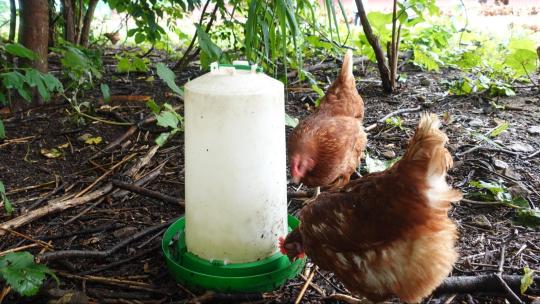
水野さんのこだわり02「平飼い、放牧」
アグリコラでは、人も家畜も心身ともに健康であることを大切にしています。そのため、平飼い&放牧スタイルをとっているそうですが、おかげで鳥インフルなどかかることもなく健康なんだそうです。
キッズの質問「平飼いと放牧って何が違うの?」
「鶏舎の中で放し飼いの状態で飼育するのが平飼いで、屋外でニワトリたちが外で自由に走り回れる状態の飼育が放牧です。」と水野さん。
一般的な養鶏の「ゲージ式」は、一羽あたりiPad一台分程度の広さのゲージの中で過ごし、鶏舎には窓がないそうです。
アグリコラのニワトリは、土を掘ってみたり、草をついばんだりする姿がほほえましく、みんな元気いっぱい。ずっと見ていられるくらいかわいかったです。

水野さんが大切にしていること03「農福連携」
「アグリコラは、障害のある方が活躍できる農福連携の取り組みを行っています。」と水野さん。
就労継続支援A型事業所、つまり障害のある方も「仕事として」農業に従事できるということです。
「持続可能な農業」は、言葉にすると短いですが、ここに至るまでの相当なご苦労があったはず。人とニワトリの健康、食べ物としての品質、環境、きれいごとではなく全部大切にしながら、商売としても成立させていく。本当にすごいなぁと思いました。

キッズからの質問タイム
Q. ニワトリは一日に卵を何個生むの?
水野さん「1日一個生めばいい感じです。ニワトリは25時間ごとに一個生みます。なので、毎日ちょっとずつ生む時間が少しずつずれて、午後3時くらいになったらその日は生むのをお休みします。なので、10日間で8~9個生みます。」
Q. このニワトリの卵からはヒヨコは生まれるの?
水野さん「ここにはメスのニワトリしかいません。メスのニワトリだけで卵を生むのだけど、人間と同じく、赤ちゃんが生まれるためにはオスのニワトリの精子が必要です(受精)。この卵は受精していないため、卵は孵らないのです。」
Q. ニワトリは何年くらい生きているの?
水野さん「ニワトリにも寿命があります。ただ、人間のおばあちゃんが赤ちゃんを生まないように、ニワトリも齢をとると卵を生めない身体になるの。私たちはニワトリからもらった卵を売ってお金にしています。ニワトリから卵がもらえなくなってしまうと、お金に��ることもできません。なので、ニワトリには��し訳ないけれど、役目を終えてお肉になるということをしています。ちょっと悲しいけれどね。」

二カ所目 現代式トマト栽培!?「Jファーム」の植物工場
夏は野菜がたくさん収穫できる季節ですが、北海道の冬は雪が積もります。当たり前ですが、冬は野菜の露地栽培ができません。一年中安定して栽培するために、巨大なハウスの中でトマトを栽培するJファームの「植物工場」を見せていただきました。場所は、札幌市東区。
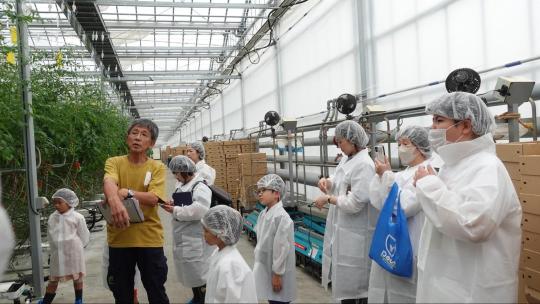
苗の見た目にビックリ!
中に入ってまず驚いたのが、ミニトマトの苗の背の高さ!全長はなんと7メートルくらいあり、長~いトマトの苗を天井から紐を使って吊るるように支えて、光の当たりやすい高さに調整しています。家庭菜園だと、1.7メートルくらいの苗を支柱で支えているので、その違いに驚きました。そして7メートルもあるのに、茎の太さは親指程度しかなく、思ったよりも太くないことに驚きました。
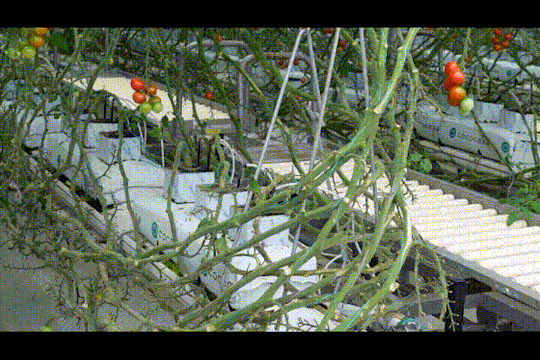
トマトの生育環境に合わせて徹底管理
ハウスの中に入ると、モワッとした熱気が立ち込めるのかと思いきや、意外と過ごしやすい温度帯。この日がたまたま涼しい日だったというのもありますが、トマトが生育しやすい環境に温度管理は徹底しているのだとか。「水は肥料分を溶かしたものをチューブを使って与えています。時間帯や量を管理し、あえて根元が乾く時間帯を設けています」と工場長。
トマトの原産はアンデス山脈の乾いた高山地帯ですから、「暑すぎない」「乾いている」という環境をハウス内で作り出しているということですね。

収穫量は一日4トン!
今回見学させてもらった品種は、「ダルダリー」というオランダ産のミニトマト。苗が長持ちするため、長期間の収穫にむいている品種ということで、今年から取り扱いを始めたそうです。
収穫量は現在、多い日で一日4トン程度。さらに最終目標は、その3倍以上の収穫量を設定しているそうです。
キッズの質問「もっといっぱい収穫するには、栄養の量を増やせばいいの?」
工場長「重量を上げるには、栄養も関係するけれど、二酸化炭素の量も大切です。光合成に必要なのは二酸化炭素。だから天井の窓を開けてハウスの中に外気を取り入れる調整が欠かせないのです。窓はコンピューターで自動制御しています」
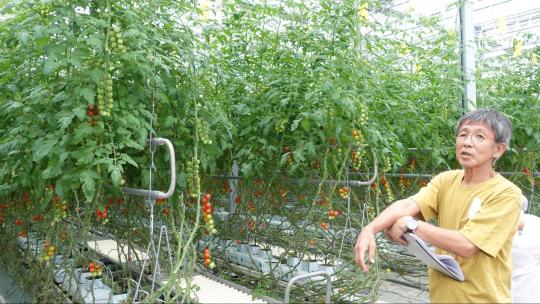
ちなみに、工場というイメージから収穫作業は機械なのかと思いきや、昇降機にのって人が手摘みしているそうです!
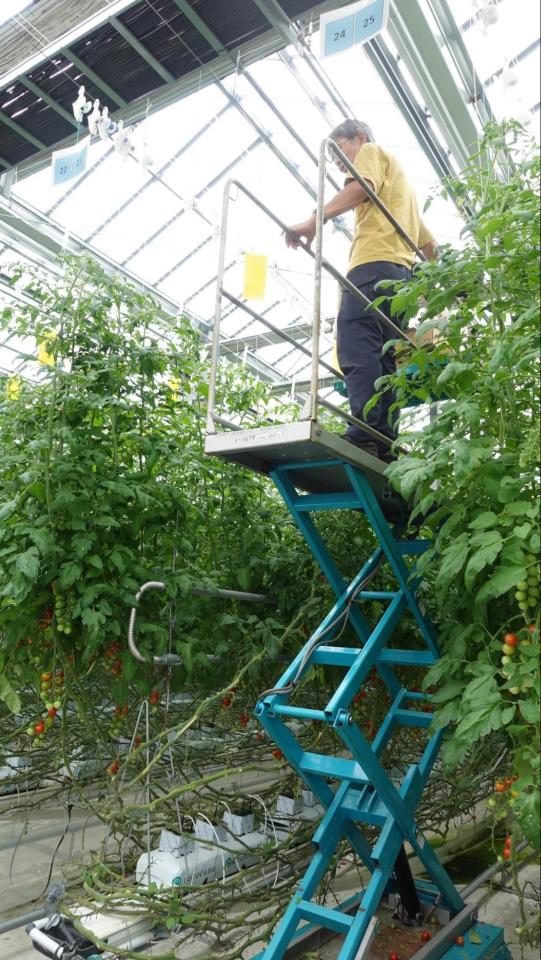
車内では「野菜○×クイズ大会」
移動車の中では、○×クイズ大会。大人でも迷うくらいの絶妙な問題で、大盛り上がり。
司会の“みっちゃん”がさらに盛りあげてくれて、目的地まであっという間に到着する楽しい時間を過ごしました。

思春期に突入した息子。周りよりも少しお兄さんだったため、最初は遠慮がちでしたが…しっかり楽しんでいるし(笑)
お待ちかねのランチタイム!
「サッポロさとらんど」に戻り、調理室でランチタイムの準備開始!部屋に入るとスパイスの匂いが…お、お腹が空いちゃったよ~!
サラダ作りプチ講座
子どもたちは、各家庭分のサラダづくりにチャレンジ!レタス類もフリルやベビーリーフなど何種類かあって、少しずつ形が違うだけで、玉レタス一種類だけで作る時と比べて見栄えが良くなることもわかりました。そして、野菜ソムリエプロの大澄さんが、サラダを美味しく作るコツを教えてくれました。
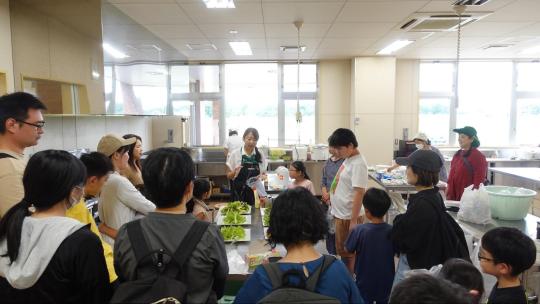
美味しくなるポイント01「レタスのちぎりかた」
大澄さん「コツは、横にちぎるのではなくて、葉の繊維にそって縦にちぎると美味しくなります」。「ちょっとしたこと」なんだけど、試してみると本当に歯ざわりが違ってくるから、不思議!

美味しくなるポイント02「ドレッシングの和え方」
ドレッシング…上からかけていませんか?「レストランではドレッシングは上からかけていないけれど、美味しいですよね?」と大澄さん。たしかに、ドレッシングが一ヵ所だけ集中してかかっているとしょっぱいですが、全体に均一に味がついている方が美味しいです。(なので、この見出しも「和える」という表現にしました)
均一に味を付けるコツは、ビニール袋に野菜とドレッシングをスプーン二杯入れて……フリフリ~!このやり方ならば、子どもでも楽しくお手伝いできそう!

そして、まんべんなくドレッシングが行き渡ることで、ドレッシングの油分が野菜をよりツヤツヤに魅せてくれます。
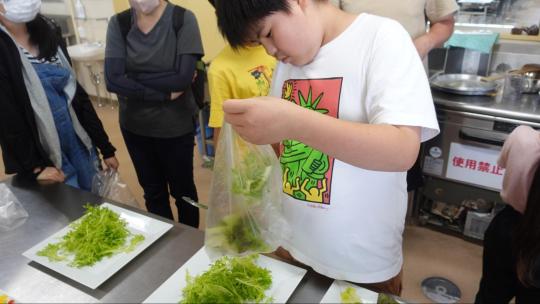
完成した、スペシャルランチはこちら!
食材は、ほぼ北海道産です!
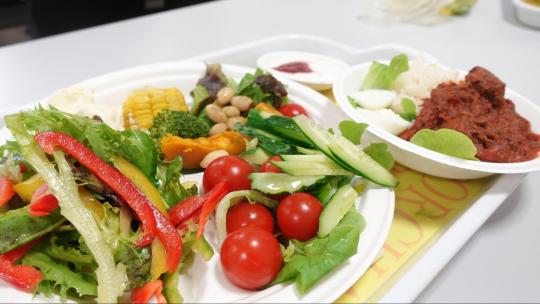
手前のミニトマトは、先ほど見学した「Jファーム」のトマト。
ピカピカで宝石みたいです!
プレートの中央にあるカボチャは、札幌市手稲山口の特産「大浜みやこかぼちゃ」、そして今が旬のトウモロコシ。
写真奥のカレーは、トマトと牛肉の夏カレー。牛肉は道内産で「キタウシリ」というホルスタイン種の肥育牛がたっぷり入っています。
そして、アグリコラの卵も「玉子サラダ」になっていました。
見てください、このクリーム色の黄身を!
”見た目ウケのために飼料に着色料を混ぜたりしない“とは言ってましたが、着色しないと黄身がこんなに色が薄いことを知りませんでした。
そして、黄身の色が薄くても、味はしっかり。それでいて全く臭みを感じない、澄んだ味でした。
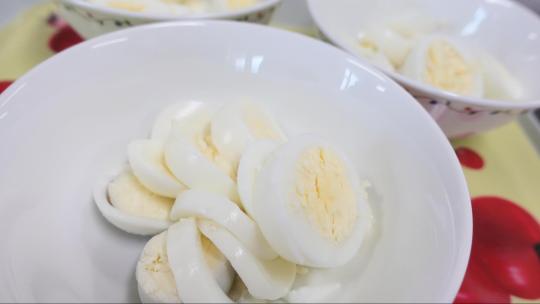
まとめ
近郊農場をめぐり、生産者さんの話を聞いて、最後は採れたて野菜や地元の食材たっぷりのランチで締める!農場見学もランチも大満足!頭も心もお腹も満たされる一日でした。
主催 農業魅力再発信プロジェクト推進協議会
運営・企画 HERB & COOKING KINA
2 notes
·
View notes
Photo
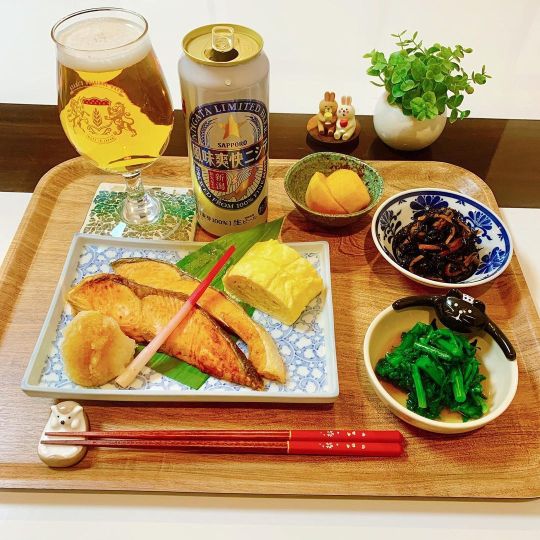
なう(2023/01/21 21:43:30) 朝食用の鮭やったけど昨日?今日?の深夜 三時頃旦那から「帰る🐸コール📞」あって 「吉野家で食べて帰る」とゆーので私も食べたく なって深夜3時半に吉野家の牛丼食べてしもて 起きたらまだお腹膨らんでた🤣🤣🤣から 朝食抜きで昼過ぎてらーめん食べに行った🍜 ので今夜は銀鮭ディナー🐟 けど鮭って朝食の定番じゃね?旅先での宿の 朝食では焼き鮭がよく出てくるけど 夕食で 焼き鮭が出てきた宿って一度もないしな🤔 と違和感感じながらの夕食になりました🤪 鮭だけじゃ物足りんからだし巻き玉子も付けたら もっと朝食っぽくなった😂😂😂 #銀鮭の塩焼き #焼き塩鮭 #だし巻き玉子 #春菊のおひたし #ひじきの煮物 #柿 #新潟限定醸造 #風味爽快ニシテ #私は禁酒 #家呑み #おうち居酒屋 #おうちごはん #おうちごはん部 #おうちごはんlover #今日の晩ごはん #TodaysDinner #晩ごはん記録 #献立記録 #てづくりごはん #てづくりごはん365 #cooking #cook365 #タベリー #フーディーテーブル #クッキングラム #キッチングラム #夫婦ごはん #ふたりごはん #豊かな食卓 #cyuley 焼き鮭はマイブームのノンオイルフライヤーで 焼いたけどふっくら柔らかく程よく焦げ目も ついて美味しかった☺️けど私は禁酒中😌🈲 https://www.instagram.com/p/CnrZXXZSQhN/?igshid=NGJjMDIxMWI=
#銀鮭の塩焼き#焼き塩鮭#だし巻き玉子#春菊のおひたし#ひじきの煮物#柿#新潟限定醸造#風味爽快ニシテ#私は禁酒#家呑み#おうち居酒屋#おうちごはん#おうちごはん部#おうちごはんlover#今日の晩ごはん#todaysdinner#晩ごはん記録#献立記録#てづくりごはん#てづくりごはん365#cooking#cook365#タベリー#フーディーテーブル#クッキングラム#キッチングラム#夫婦ごはん#ふたりごはん#豊かな食卓#cyuley
6 notes
·
View notes